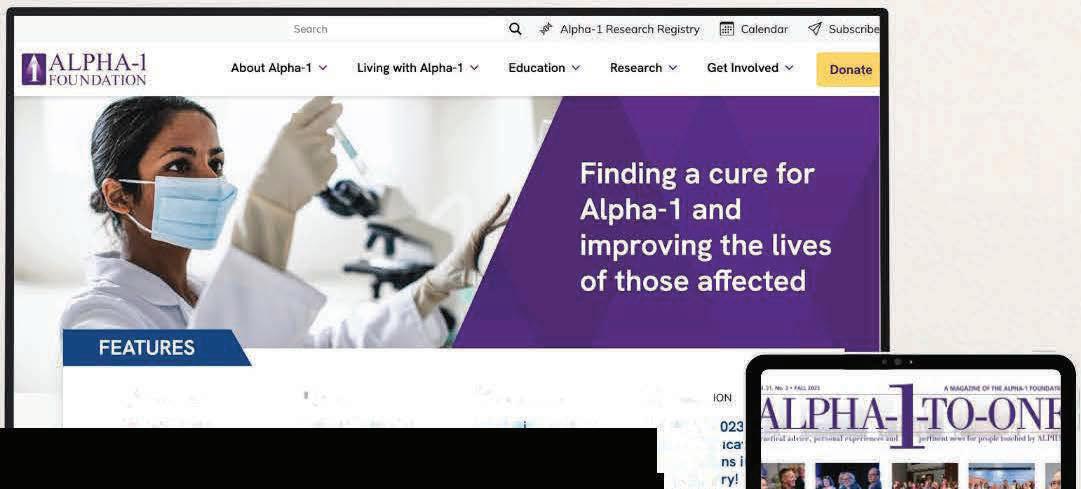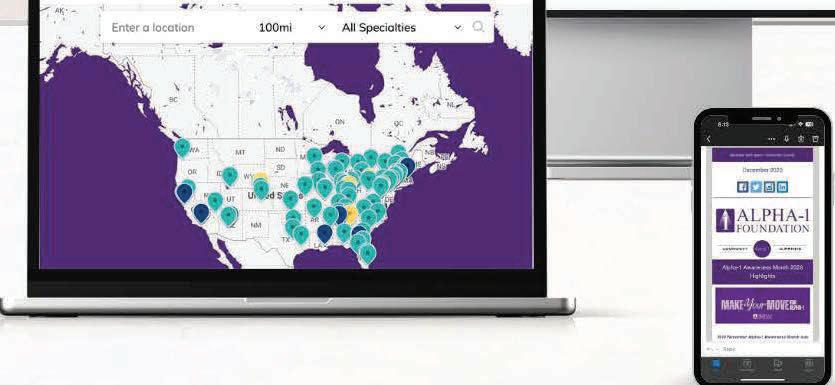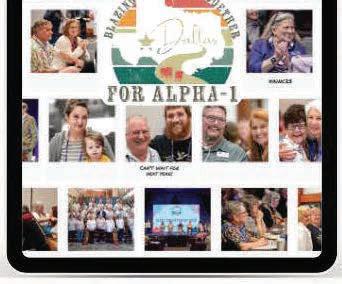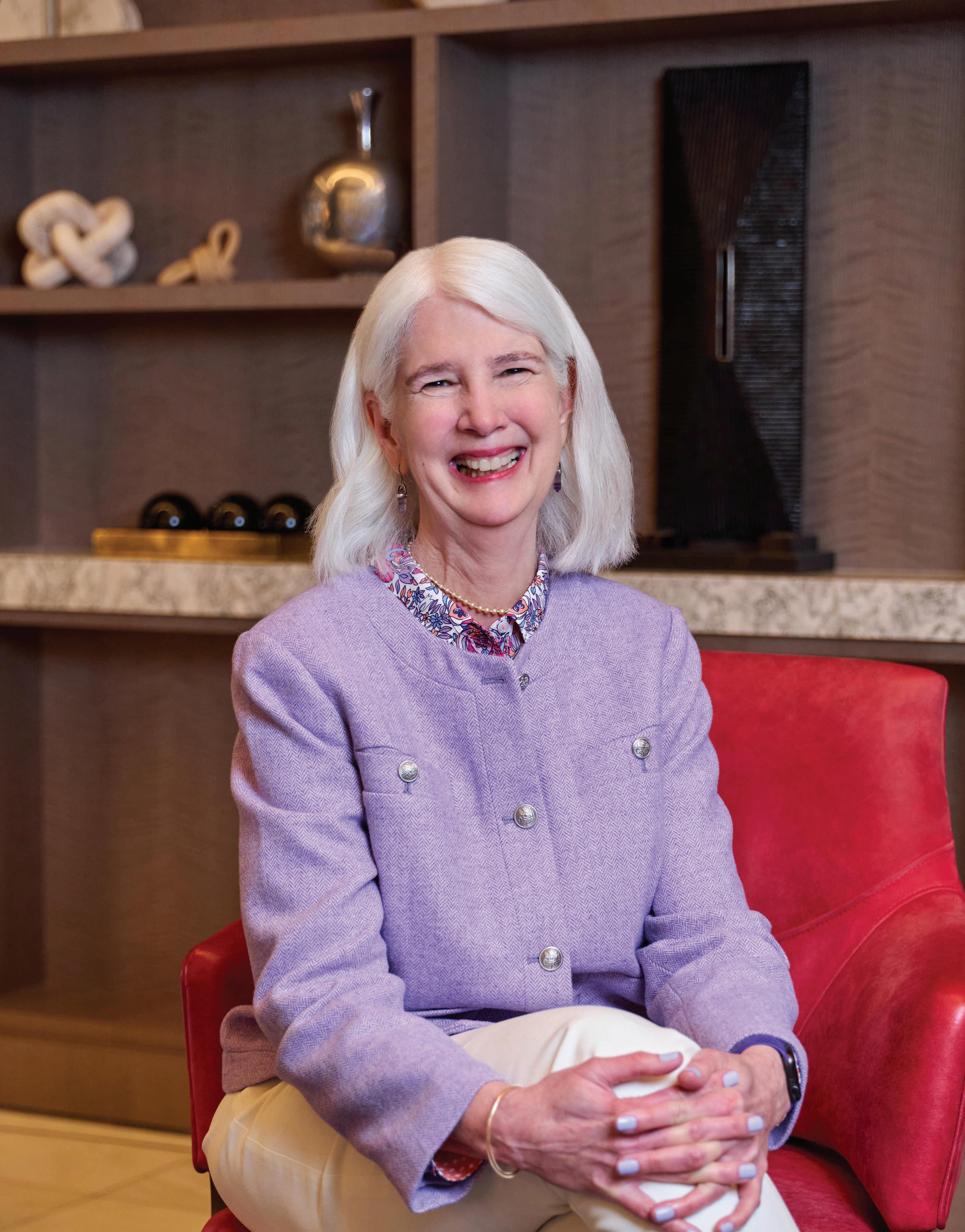

A Reason to Smile
This year and every year, the power is in you to make a difference. Your engagement, your support and your commitment play an instrumental role in helping us achieve our mission- a cure for Alpha-1.
We are honored to feature and share Peg Iverson’s incredible Alpha-1 story as we commemorate the 50th anniversary since of her diagnosis. Peg’s journey with Alpha-1 is a tale of courage and steadfast resolve and serves as an inspiration to Alphas worldwide. This milestone not only marks Peg’s personal triumph but also underscores the transformative impact of organizations like the Alpha-1 Foundation.
We find ourselves at a pivotal moment in time. The marriage of science, medicine and technology along with the leadership of the Alpha-1 Foundation has us primed to deliver for patients and their families. We know that we cannot do it alone. We are going to go fast and far together, with you; the power of the patient, providing the inspiration that fuels our efforts.
Through the Alpha-1 Foundation Research Registry, we are excited to announce that the Alpha-1 Biomarker Consortium (A1BC) Study is the largest enrolling Alpha-1 study and has reached its goal of 270 patients in expediated fashion. Led by the leadership of co-Principal Investigator Jeanine D’Armiento, MD, PhD, Columbia University, and Charlie Strange, MD, Medical University of South Carolina, the A1BC Study is funded through a multi-center grant from the National Institutes of Health (NIH) and supplemented by funding from the Alpha-1 Foundation.
Our advocacy efforts are strong, and our community continues to lobby in Washington, DC for HR 4438: The John W. Walsh Home Infusion Act now standing at 45 co-sponsors and growing each week. With the passing of this legislation, Alphas will be afforded home infusions under Medicare Part D. A benefit that is crucial to the sustained health and well-being of Alphas on weekly infusions around the country.
Congratulations to Dr. Monica Goldklang on being the well-deserving recipient of the 2024 Shillelagh Award at the annual Celtic Connection event in Boston. We applaud the Celtic Connection committee for the dedication and commitment to this Building Friends for a Cure (BFC) event. This event has become the largest BFC event through the outstanding support of the committee and sponsors. This year the event surpassed all goals to help support research and related programs.
We look forward to seeing you at the upcoming Alpha-1 National Conference from June 7-9 in Miami, Florida. This year’s theme “The Power is in You to Make a Difference” acknowledges the spirit of the Alpha-1 community and the power each person in the community can have to make a difference. At this year’s national conference, you can look forward to hearing from leading Alpha-1 experts, meet with fellow Alphas and learn about all the programs and resources that can empower you each and every day. Learn more about this year’s conference on page 16.
Please visit our website frequently (www.alpha1.org) to learn about upcoming events and to register online. Take a moment to visit the event map on page 30 to see where we can meet you this year. There is something for everyone! The power is in you, and in all of us, to achieve great things together.
Sincerely,
 Scott Santarella President & CEO Alpha-1 Foundation
Scott Santarella President & CEO Alpha-1 Foundation
Alpha-1 Foundation Board of Directors Executive Committee
Jon Hagstrom*, Chair
Fred Walsh*, Vice Chair
Peg Iverson*, Secretary
Kenneth A. Irvine +, Treasurer
Virginia Clark, MD, Physician-Director Members
Mark L. Brantly, MD
Jennifer Jopp*
Ann Knebel, PhD, RN
Darrell N. Kotton, MD
Noel G. McElvaney, MC, MCh, BAO, FRCPI, FRCPC
Faron Schonfeld*
Catherine Vernon*
Martin R. Zamora, MD, Director Emeritus
Alpha-1 Foundation Executive Staff
Scott Santarella, President & Chief Executive Officer
Mark B. Delvaux, Chief Financial Officer
Andrew A. Wilson, MD, Scientific Director
Robert A. Sandhaus, MD, PhD, FCCP, Clinical Director
Jeanine D’Armiento, MD, PhD, Medical Liaison
Alpha-1-To-One Editorial Board
Gordon Cadwgan, PhD*;Erin Carr+; Catriona Garry*; Jon Hagstrom*; Andrew A. Wilson, MD; William J. Martin II, MD: Robert A. Sandhaus, MD, PhD, FCCP; Patricia Tew*; Bruce C. Trapnell, MD
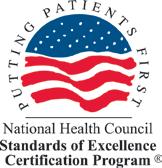
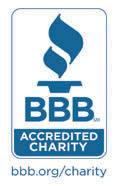
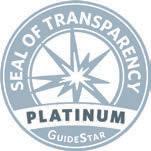
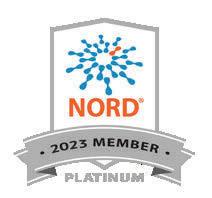
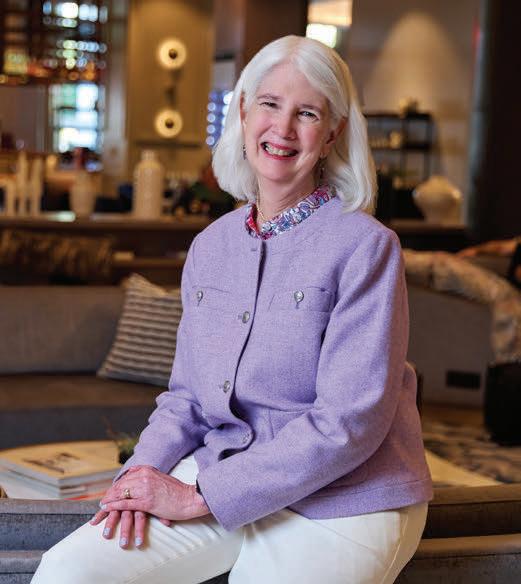
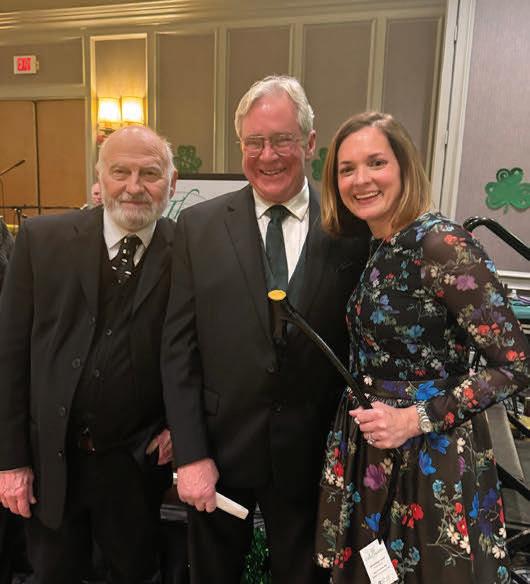
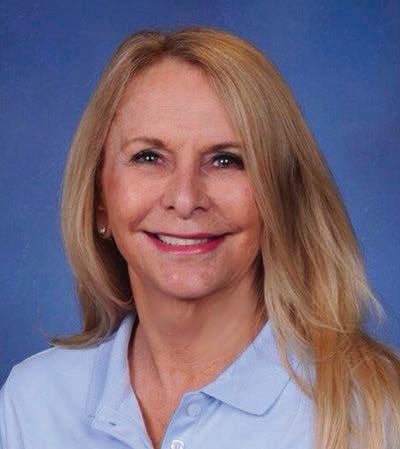





Commemorating 50 Years since Diagnosis:
Peg Iverson’s Inspirational Story with Alpha-1
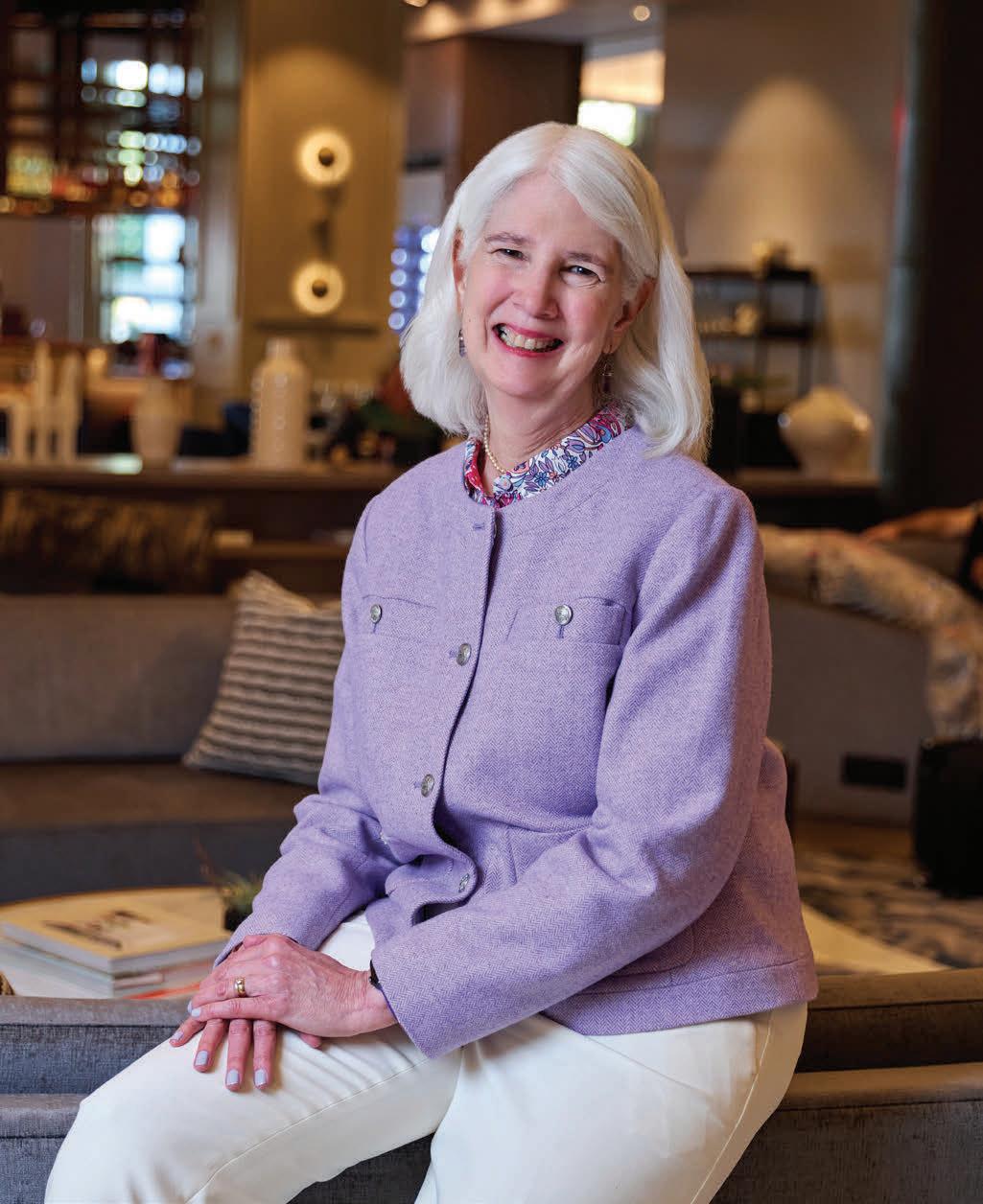
Peg Iverson’s Alpha-1 story stands as a testament to resilience, community, and advocacy. This year marks the 50th anniversary of her diagnosis with Alpha-1 Antitrypsin Deficiency (Alpha-1), a milestone that not only reflects her personal triumph, but also underscores the transformative impact of organizations like the Alpha-1 Foundation.
Born 71 years ago into a world lacking resources for rare diseases, Peg’s diagnosis in 1974 marked the beginning of a journey filled with challenges and uncertainties. In those early days, resources and support networks were virtually non-existent. However, Peg’s spirit and the unwavering support of her mother, Helen Kline, propelled her forward.
Reflecting on her diagnosis, Peg recalls, “When I was diagnosed at 21 years old, there was not an Alpha-1 Foundation, social media, or even e-mail. Now, technology and the strong desire of Alphas to connect and find one another have brought us to the present.” Peg has been a trailblazer in the Alpha-1 community, advocating for awareness, research, and improved access to care.
Peg’s experience serves as evidence of the lifechanging power of education and awareness. Through her experiences, she has navigated the challenges of living with a rare condition and paved the way for others. The establishment of organizations like the
Alpha-1 Foundation has been instrumental in shaping the Alpha-1 community and providing support to individuals like Peg. Alphas have found belonging and solidarity through multiple resources. Peg emphasizes the significance of these networks, stating, “The Foundation brings patients together now in ways that didn’t exist when I was diagnosed. We now have support groups around the country, Alpha-1 Education Days, an annual Alpha-1 National Conference, peer guides, a patient information line, and so much more.” Like many Alphas, she was inspired by the vision of John W. Walsh, the founder of the Alpha-1 Foundation, whose leadership transformed Alpha-1 research and patient advocacy.
Family History
Peg’s uncle, a smoker, died at 40 of severe emphysema because he did not know he was an Alpha. Her mom, who never smoked, died at only 54 years old, in the prime of her life. She passed away while Peg was pregnant with her first child. She never got to meet her grandson who was born only eight days after her death. Helen was only the 36th Alpha diagnosed at the Mayo Clinic in 1974, and because of her correct diagnosis, they knew to test Peg and her brother. Peg was correctly diagnosed at age 21 while she had completely normal lung function.
What family members should be tested for Alpha-1?
The Alpha-1 Foundation strongly encourages people with Alpha-1 symptoms and their family members to be tested. This includes:
▶ The parents of a person with Alpha-1
▶ The siblings of a person with Alpha-1
▶ The child/children of a person with Alpha-1
▶ Extended family members, such as aunts or uncles and cousins, of someone diagnosed with Alpha-1
Family members may have one or two Alpha-1 genes and not be aware of their own health risks and the chance of passing on the Alpha-1 gene to their children. If they learn they have Alpha-1 or are a carrier, they may consider making lifestyle, professional or personal choices that could maintain or improve their health.
Peg’ s mother’s resilience in the face of a decadelong battle with Alpha-1 left a lasting mark on Peg’s life, shaping her with profound lessons in courage and perseverance. When Helen received her Alpha-1 diagnosis during a time when treatment options were unavailable, she confronted the harsh reality of having limited life expectancy. Peg vividly recalls the weight of the prognosis delivered by her mother’s physicians: “They told her to go home, get her affairs in order, and she wasn’t likely to live very many more years.” Despite the daunting outlook, Helen’s spirit remained unbroken as she embraced each day with determination.
As Peg grew into adulthood, her mother’s constant presence guided her, and her legacy of strength and love continued to resonate deeply. Peg acknowledges the profound impact of her mother’s diagnosis with Alpha-1 and recognizes the shared experiences that bind the Alpha-1 community together.
“I was the only Alpha my mom ever knew,” Peg shares, underscoring the importance of the Alpha-1 Foundation in providing community and support for individuals with Alpha-1.
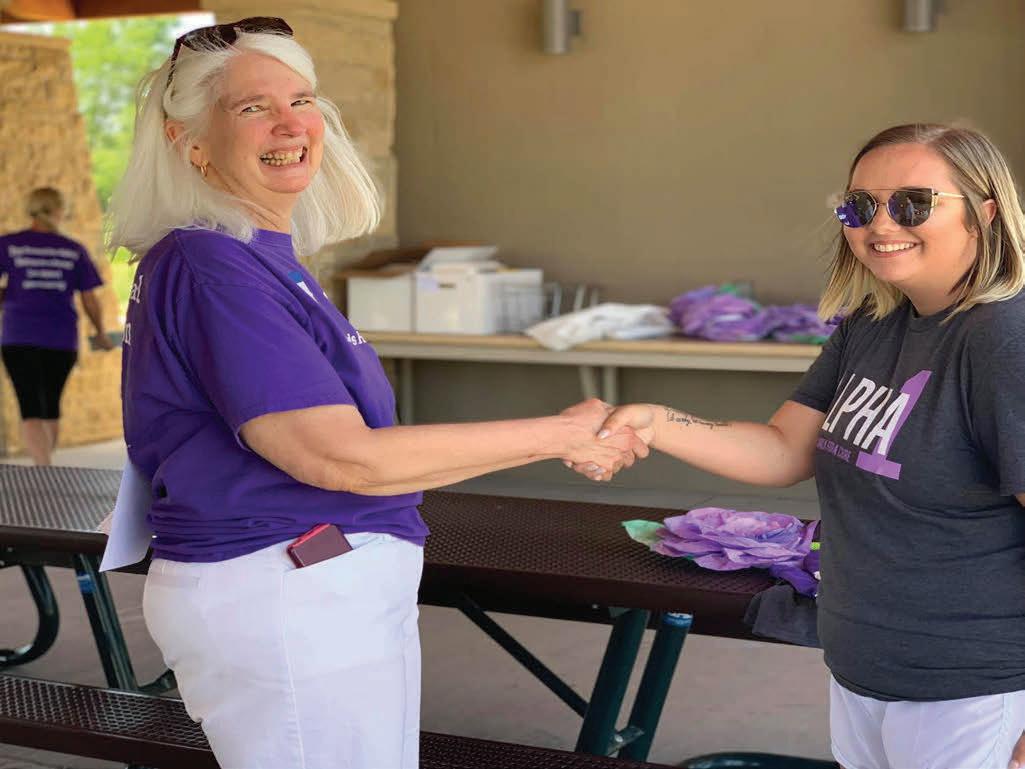
Participation in Research
In 1985, Peg participated in the first study on Alpha-1 at the National Institutes of Health (NIH). Guided by fate, she learned about the study through a relative of her father’s wife who happened to be a pulmonologist. Once the NIH study completed, they connected her with her Clinical Resource Center pulmonologist in Iowa, Dr. Jeff Wilson, from the University of Iowa. This encounter marked the beginning of Peg’s involvement in research and clinical trials, a commitment that spanned five years and paved the way for advancements in treatment. Peg acknowledges Dr.
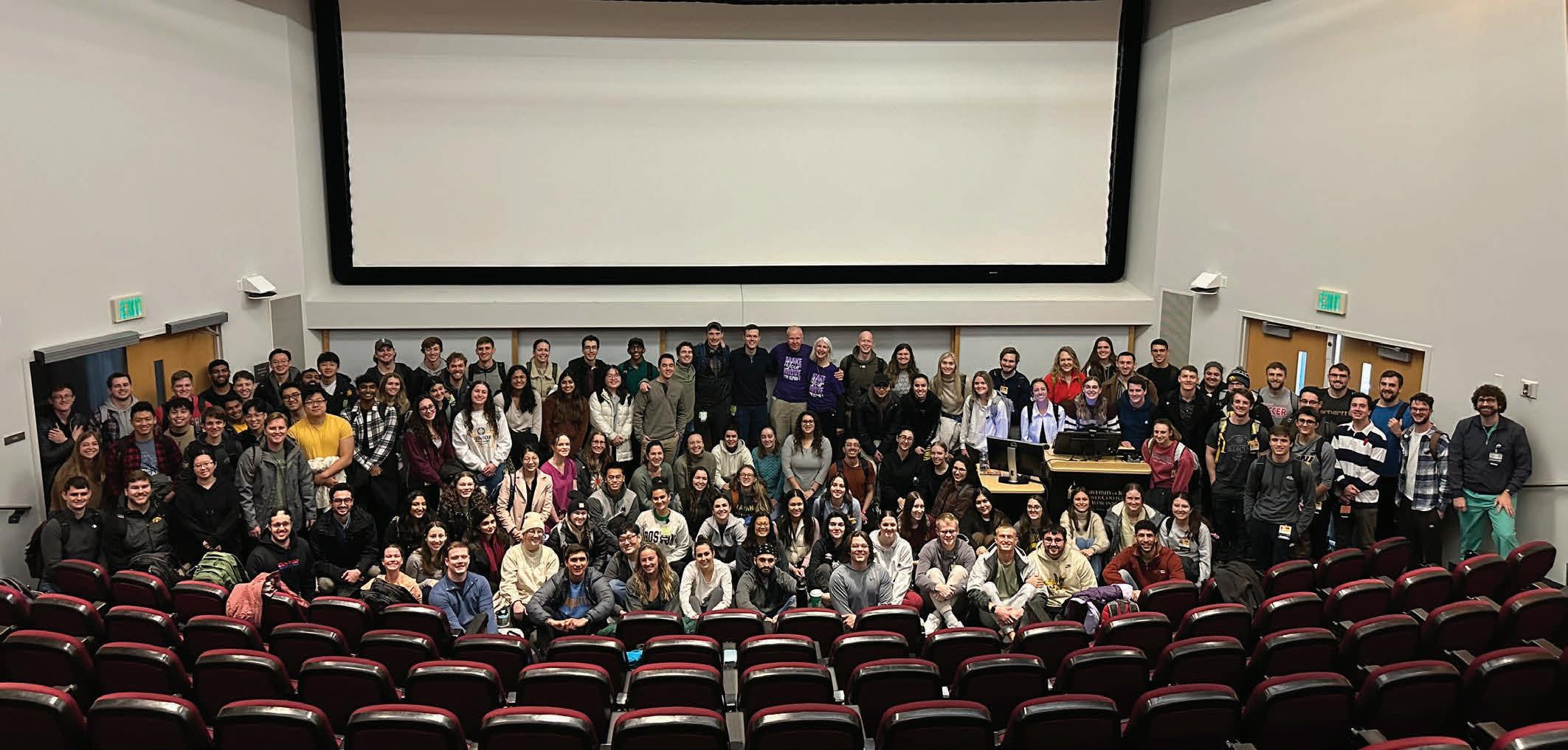
Commemorating 50 Years since Diagnosis:
Peg Iverson’s Inspirational Story with Alpha-1
Wilson, an Alpha-1 Foundation Clinical Resource Center physician, who has been her trusted partner in managing her condition for over three decades. She fondly remembers, “Dr. Wilson has been with me every step of the way, offering not just medical expertise but also unwavering support and guidance.”
Thanks to ongoing research efforts, advancements in Alpha-1 treatment have been significant over the years. Peg highlights the development of augmentation therapy as pivotal, providing her with options and improving her quality of life.
Testing and early diagnosis is critical. Peg was able to protect her lungs because of this knowledge. She knew when her lung function began to decrease 19 years ago and was able to begin treatment immediately. She is grateful for the many plasma donors that are committed to helping save lives.
Community Engagement
Peg is a member of the Alpha-1 Foundation’s Board of Directors and serves on the Executive Committee as the Secretary. She began working as an AlphaNet Coordinator in 2011 and serves as an AlphaNet Program Manager. She is a past Iowa Support Group Leader, attends the regular Iowa support group meetings and holds an annual Alpha-1 Building Friends for a Cure fundraising event, called “Iowa Get the Scoop on Alpha-1” to help fund a cure. Joined by family and friends and several liver affected children and their families, this model event has been replicated in other cities across the country to help increase awareness of Alpha-1. Peg is the chair of the Community Engagement Advisory Committee, as well as an avid advocate and actively involved in Alpha-1 public policy efforts.
Peg’s journey is intertwined with the historical milestones of Alpha-1 research and the personal stories of individuals affected by the condition. Reflecting on her mother’s experience, Peg emphasizes the importance of early diagnosis and access to care. She shares her hopes for future generations of Alphas, envisioning a world where every individual is detected early and empowered to contribute to a cure. As an advocate for Alpha-1 patients, Peg emphasizes the importance of government support in improving access to care.
From cherishing moments with her family to indulging in her love for travel, Peg finds joy in life’s simple pleasures. She shares her aspirations, highlighting the importance of living life to the fullest despite challenges; “ First is my family and my two sons. Anytime we’re together, those are the happiest moments in my life.”
1 ALPHA-1 FOUNDATION
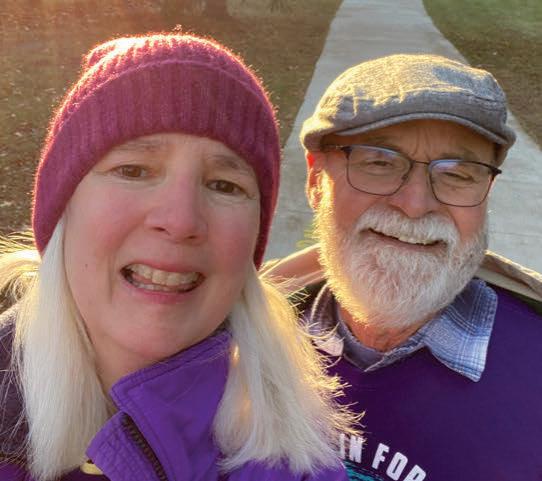
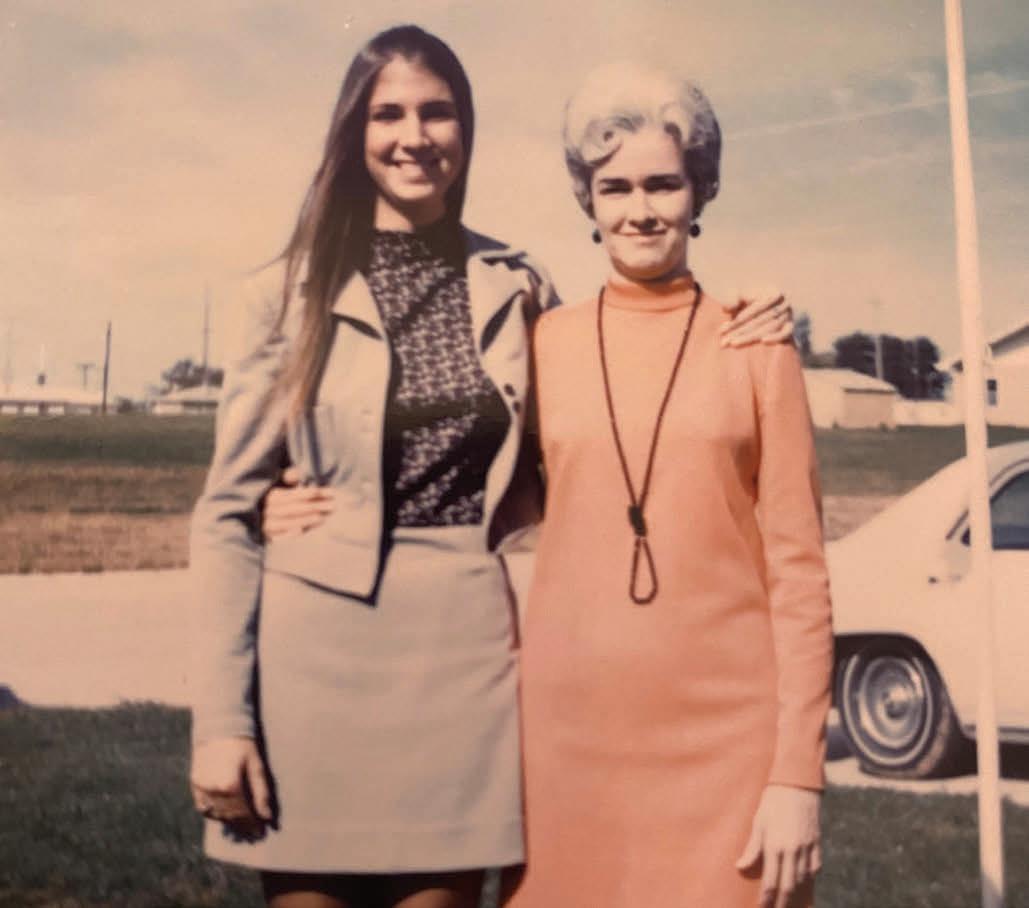

Empowering ChangeAlpha-1 Global and Alpha-1 Europe Alliance Webinar
On February 19, 2024 the Alpha-1 Foundation’s Global program, in cooperation with the Alpha-1 Europe Alliance, organized a webinar which explored the impact of the European Union (EU) Substances of Human origin (SoHO) Regulation on the lives of European Alphas. The speakers included Scott Santarella, CEO of the Alpha-1 Foundation, Dr. Heinz Stutzenberger, Vice President of the board of Alpha-1 Europe alliance, Sebastian Rhode, Founder of Rhode Public Policy group (RPP), Kinga Wojtowicz, Head of Office and Senior Account Director at RPP, and Anton Stoyanov, Consultant at RPP.
The primary objective of the webinar was to provide an understanding on how patient organizations can engage with national policymakers, contribute their perspectives on the way plasma is collected throughout the EU and ultimately ensure that there is sufficient plasma supply for all patients relying on prescription drug monitoring programs in Europe.
Plasma is crucial for Alphas – for the development of treatments and ultimately for improving their lives. The EU SoHO Regulation focuses on plasma collection and distribution within the EU aiming to ensure its selfsufficiency. After years of discussions, the final adoption of the file is expected to take place in April before entering into force 3 years later.
The webinar began with a historical overview of the governance of blood and plasma in the EU. The EU Blood Directive, a legislation governing blood safety, collection, and distribution for almost two decades, will now be replaced by the SoHO Regulation. Originally adopted in response to blood contamination scandals during the 1980s and 1990s, the Directive aimed to address heightened concerns surrounding blood safety, leading to a transfer of responsibilities from national governments to the EU.
Twenty years after the Directive’s adoption, however, safety concerns have been largely laid to rest, with
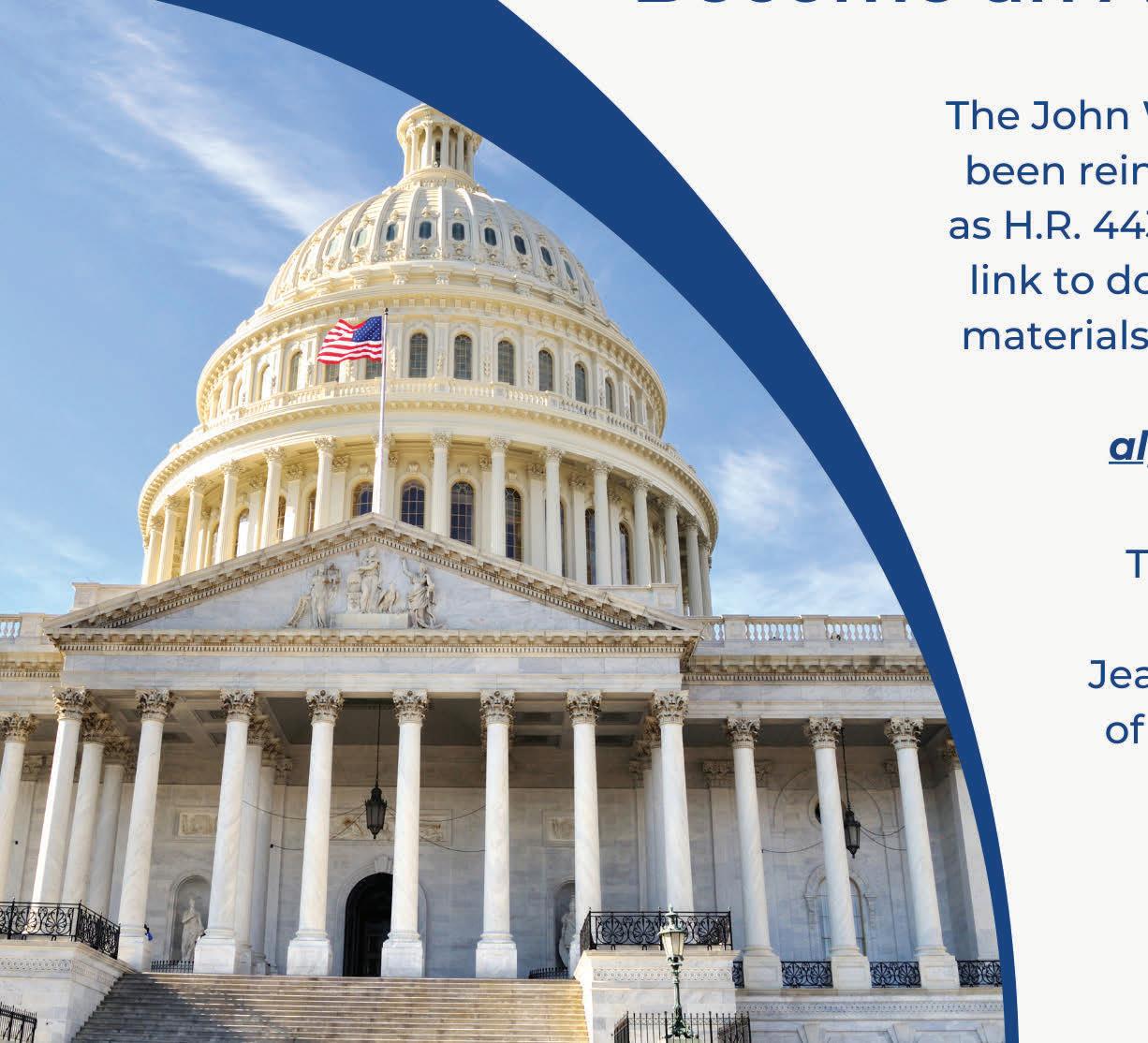
the EU SoHO Regulation instead aiming to ensure “continuity of supply” of products – a concern that came to the forefront during the COVID-19 pandemic. The speakers highlighted that this shift in terminology and mindset not only provides many opportunities for new types of advocacy, especially by patient advocates, but also liberates previously contentious areas, offering Member States the flexibility to identify and incentivize new donor communities.
This new landscape allows patients to approach policymakers with a positive message about the need to learn from other countries and their best practices in plasma collection – notably when it comes to different successful collection models contributing to a high and reliable supply.
The webinar then focused on advocacy itself, highlighting the pivotal role patients play in effecting change. The session provided guidelines and a pattern for up-and-coming patient advocates and underscored the importance of amplifying the voices of patients in policy debates and discussions. With some Alphas already having substantial advocacy experience, the key takeaway of the session was the importance of cooperation and knowledge sharing within the community.
The webinar culminated with a discussion, where participants representing various Member States actively contributed their viewpoints, deliberating on specific actions to improve plasma collection within their respective countries, centered notably on different incentive models applied in Member States, and on different ways of ensuring the creation of broader donor communities.
The final message for all participants was that patients have the power to achieve much – should they work together, collaborate and learn from each others’ experiences. 1 ALPHA-1 FOUNDATION
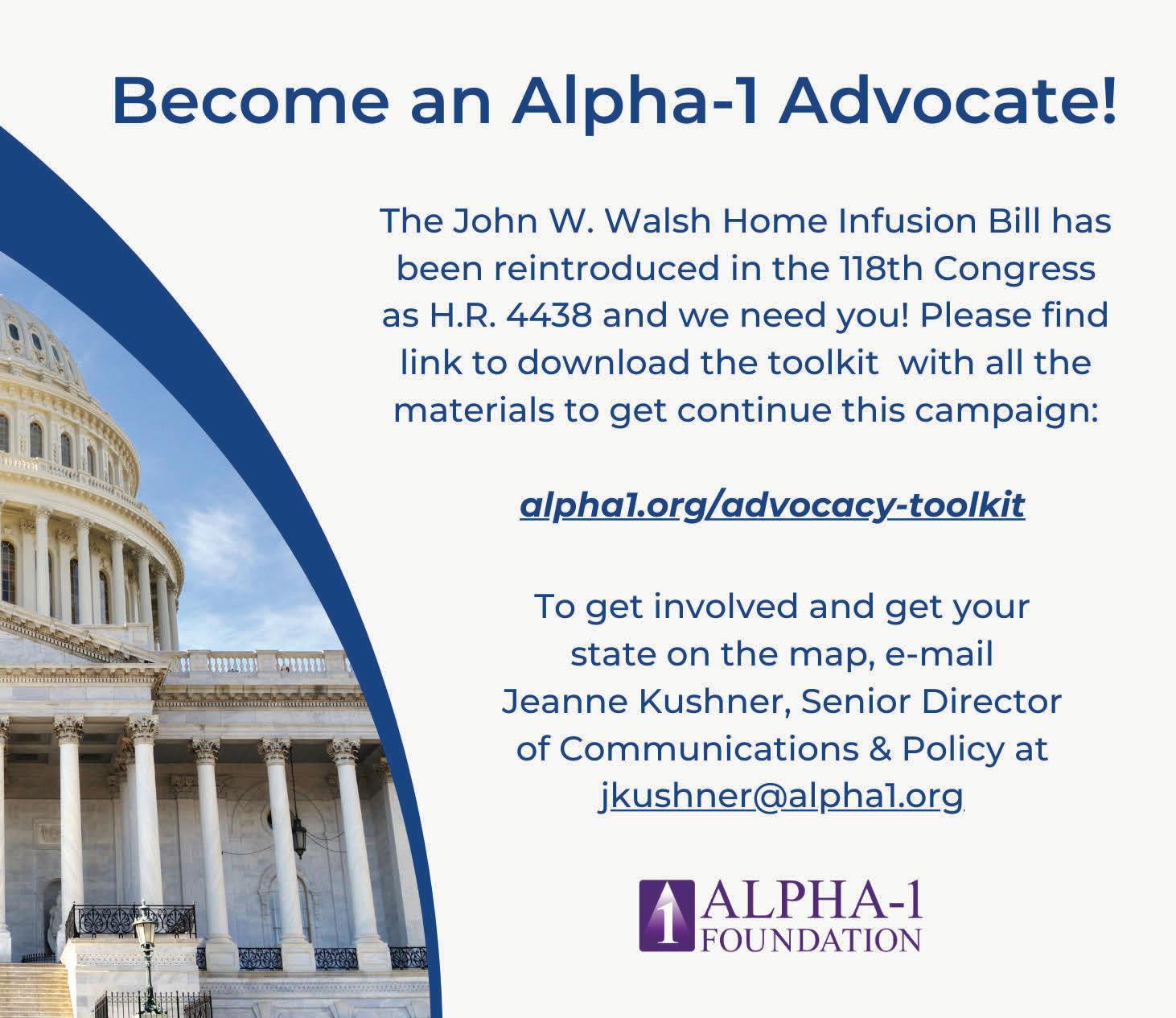
ARE YOU ON A JOURNEY WITH ALPHA-1 LIVER DISEASE?

The Redwood Study is looking for adults 18 to 75 years of age who have a confirmed or suspected diagnosis of Alpha-1 Liver Disease with PiZZ genotype. There is currently no approved treatment available for Alpha-1 Liver Disease. The investigational study drug aims to reduce the production of the abnormal Z-AAT protein and its buildup in the liver. To learn more and see if you may qualify, talk to your doctor, visit a1f.org/redwood-study-prescreening, or scan the QR code today.

2024 Celtic Connection Honors
Dr. Monica Goldklang
We are lucky and grateful for the outstanding and unwavering commitment of the Alpha-1 community. Over 250 people joined together on Saturday, March 9th for the annual Celtic Connection event in Boston, Massachusetts. This outstanding Building Friends for a Cure (BFC) community fundraiser honoring Irish heritage raised over $160,000 this year to support research and related programs to help fund a cure for Alpha-1.
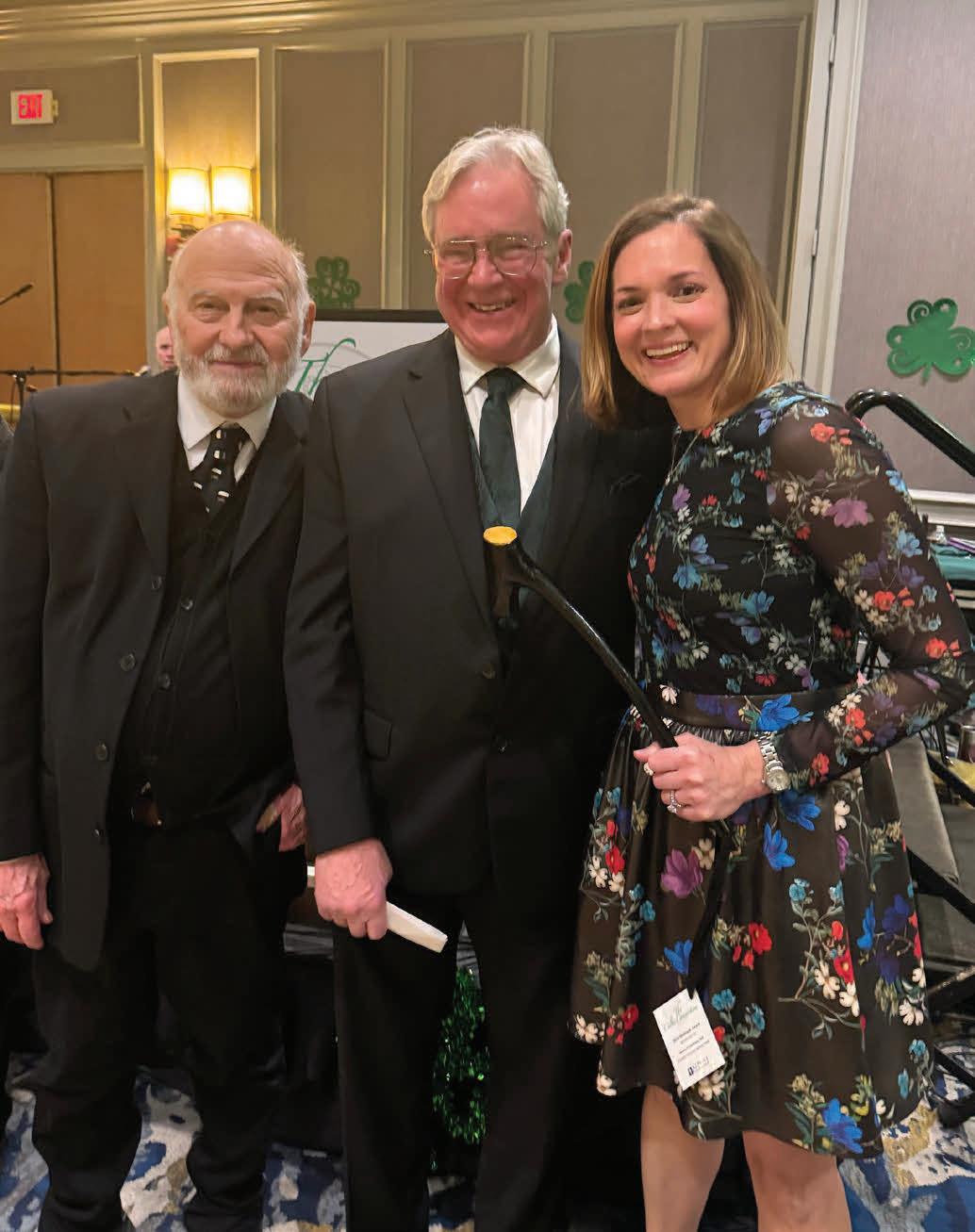
Celtic Connection has become the largest BFC event through the outstanding support of sponsors and the dedication and motivation of the longstanding committee including Julie Berry, Dan Coffin, Kathi Coffin, Bob Healy, Peg Iverson, Siobhan Lestina, Richard Lovrich, Karen Pittsley, Michael Pittsley, Rachel Sprunger, Fred Walsh, and Rick White
Thank you for your hard work and commitment in executing a successful fundraising event. Events like Celtic Connection enable members of the Alpha-1 community to get involved and be empowered to make a difference. Each year the event has grown larger, and it is truly because of the determination of the committee.
Thank you to the generous sponsors that made the evening possible: AlphaNet, Beam Therapeutics, Brigham and Women’s Hospital Lung Center, Ruth & Gordon E. Cadwgan, CReM of Boston University and Boston Medical Center, CSL
Behring, Ergonomics Group Inc (EGI), Joan & Oliver Garry, Grifols, Reidy Family, Seabreeze Floral Design, Target Tack LLC, Takeda, University of Massachusetts, Vertex and WEI
Guests were entertained by Liam Harney and the talented youth dancers from his local Irish dance studio, Harney’s Academy of Irish Dance located in Walpole, Massachusetts. The performers impressed guests with their perfect footwork, flawless choreography, and ornate costumes. Live Irish music was enjoyed by all from “Hogan’s Goat” providing a festive atmosphere. A traditional Irish dinner of corned beef and cabbage made it a quintessential St. Patrick’s Day celebration. The evening kicked off with a silent auction and reception.
The highlight of the evening was the 2024 Shillelagh award that was presented to Dr. Monica Goldklang from Columbia University for her outstanding commitment to the Alpha-1 community.
The Shillelagh is a traditional Celtic weapon associated with Ireland, and the award symbolizes the battle that Alpha-1 doctors, researchers, and leadership wage against Alpha-1. Alpha Dan Grimm presented the award on behalf of the Alpha-1 Community. Dan first met Dr. Goldklang when he participated in a clinical trial. Dr. Goldklang has been caring for Alpha patients for over six years and has been the Clinical Resource Center (CRC) Director at Columbia University since 2022. She has successfully built a practice with over 125 Alpha patients.
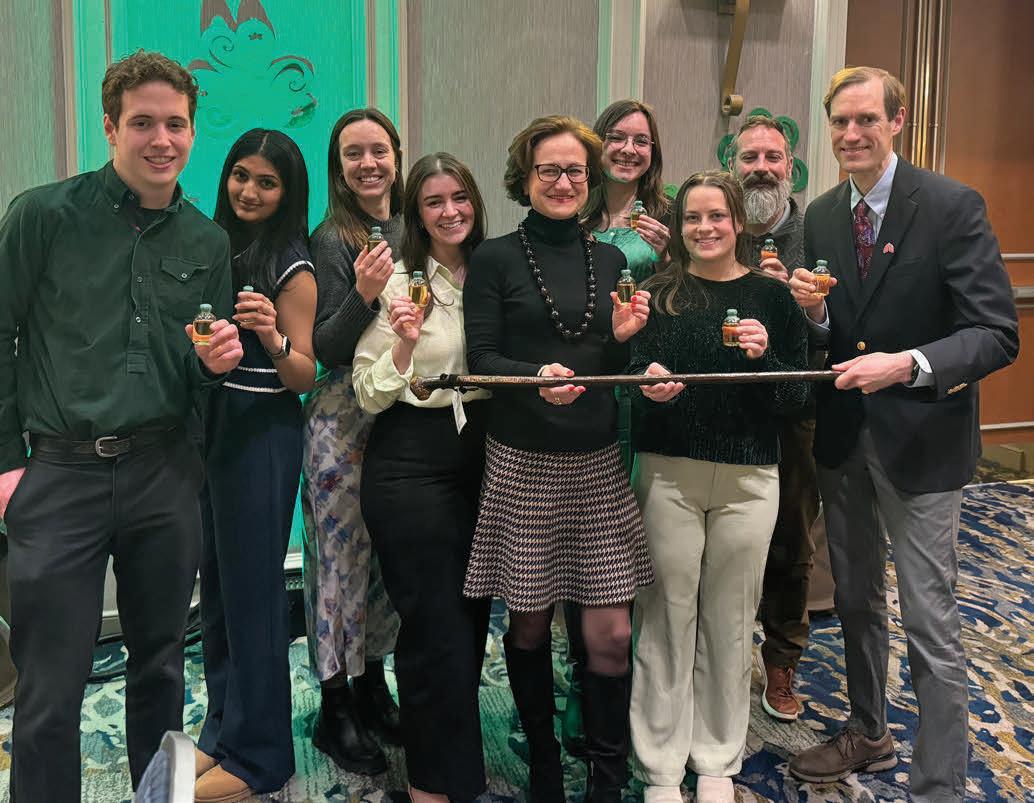
“Dr. Goldklang is not only a remarkable clinician, but she is an outstanding researcher,” said Dan. In 2014, she first obtained funding for her Alpha-1 study examining the importance of destructive proteases in Alpha-1 lung disease and discovered that Alpha-1 protein is necessary to inhibit a novel non-neutrophil protein present during viral infections and that this protein may be important during exacerbations and
2024 Celtic Connection Honors
Dr. Monica Goldklang
lung decline in patients. Her more recent funding has focused on innovative imaging technology that will allow investigators to determine early lung decline and improve prognosis in the disease. Dr. Goldklang is the lead investigator on over five clinical trials and serves as a co-investigator on the Alpha-1 Biomarker Consortium (A1BC) and has played a critical role in recruitment, achieving enrollment in record time of 270 Alpha-1 patients who will be followed over the next three years with the hopes of identifying a novel biomarker in the disease.
“I am deeply humbled to be acknowledged with this incredible award. In science and medicine, most stories start with a great mentor, and mine is one of them. When I arrived at
Columbia
in 2008, I was in search of a mentor, and through a series of fortunate
events I found Dr. Jeanine D’Armiento. I owe an incredible thanks to her for her advocacy in my career path and her friendship along the way. Working with Alpha-1 patients and their families is one of the most rewarding parts of my job, whether it be in clinic or through clinical trials. Thank you so much for this honor, and to the patients who fuel the work of all the Alpha-1 physicians and researchers throughout this wonderful community,” exclaimed Dr. Monica Goldklang.
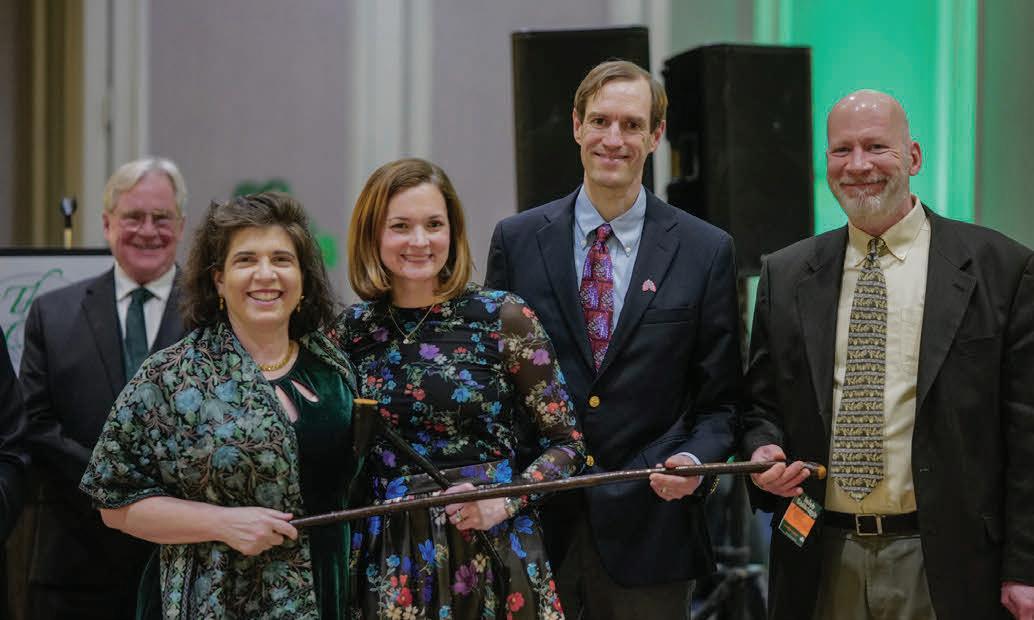

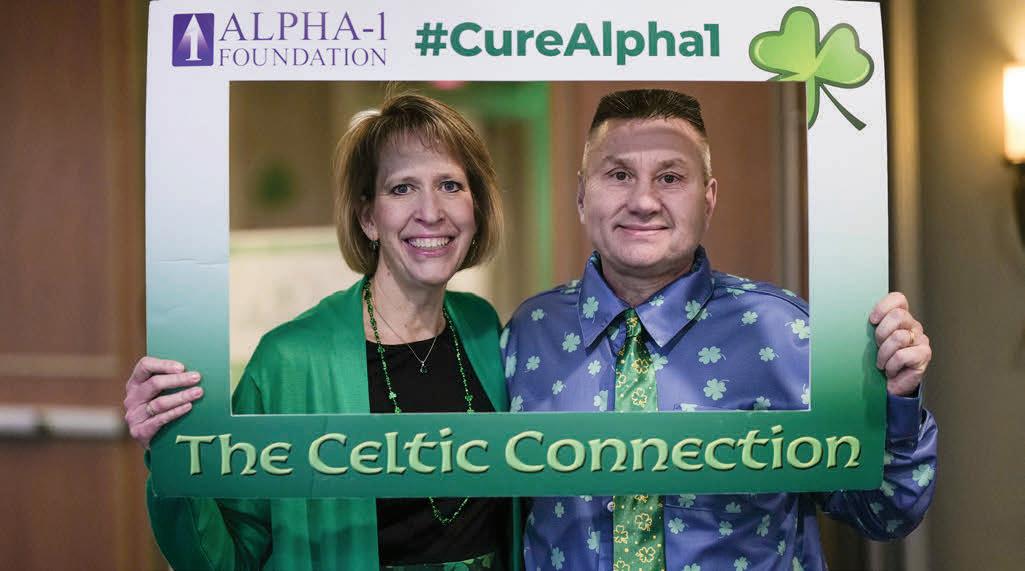

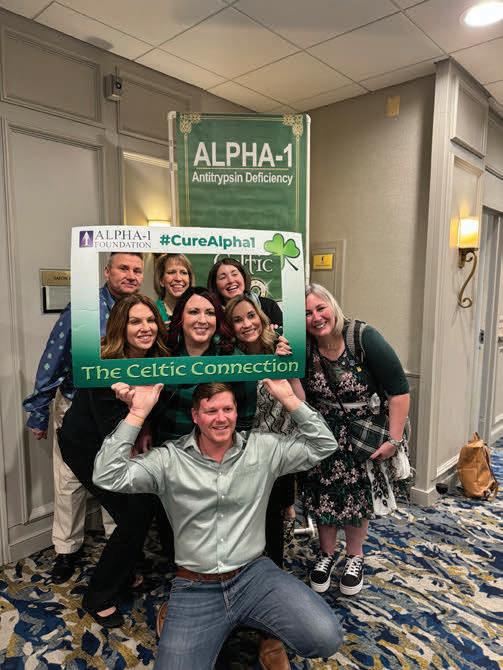

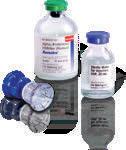

Strengthened supply. Renewed confidence. Announcing a reliable supply of ZEMAIRA thanks to the approval of an additional manufacturing site.
IMPORTANT SAFETY INFORMATION
ZEMAIRA®, Alpha1-Proteinase Inhibitor (Human), is indicated to raise the plasma level of alpha1-proteinase inhibitor (A1-PI) in patients with A1-PI deficiency and related emphysema. The effect of this raised level on the frequency of pulmonary exacerbations and the progression of emphysema have not been established in clinical trials.
Please see additional Important Safety Information and brief summary of prescribing information for ZEMAIRA on the following page. ...and our commitment to Alphas.
IMPORTANT SAFETY INFORMATION (CONTINUED)
ZEMAIRA may not be suitable for everyone; for example, people with known hypersensitivity to components used to make ZEMAIRA, those with a history of anaphylaxis or severe systemic response to A1-PI products, and those with certain IgA deficiencies. If you think any of these may apply to you, ask your doctor.
Early signs of hypersensitivity reactions to ZEMAIRA include hives, rash, tightness of the chest, unusual breathing difficulty, wheezing, and feeling faint. Immediately discontinue use and consult with physician if such symptoms occur.
In clinical studies, the following adverse reactions were reported in at least 5% of subjects receiving ZEMAIRA: headache, sinusitis, upper respiratory infection, bronchitis, fatigue, increased cough, fever, injection-site bleeding, nasal symptoms, sore throat, and swelled blood vessels.
Because ZEMAIRA is made from human blood, the risk of transmitting infectious agents, including viruses and, theoretically, the Creutzfeldt-Jakob disease (CJD) agent and its variant (vCJD), cannot be completely eliminated.
Please see full prescribing information for ZEMAIRA.
You are encouraged to report negative side effects of prescription drugs to the FDA. Visit www.fda.gov/medwatch, or call 1-800-FDA-1088.
You can also report side effects to CSL Behring’s Pharmacovigilance Department at 1-866-915-6958.
ZEMAIRA®, Alpha1-Proteinase Inhibitor (Human) lyophilized powder for reconstitution for intravenous use
Initial U.S. Approval: 2003
BRIEF SUMMARY OF PRESCRIBING INFORMATION
These highlights do not include all the information needed to use ZEMAIRA safely and effectively. See full prescribing information for ZEMAIRA.
-----------------------------------INDICATIONS AND USAGE----------------------------------
• ZEMAIRA is an alpha1-proteinase inhibitor (A1-PI) indicated for chronic augmentation and maintenance therapy in adults with A1-PI deficiency and clinical evidence of emphysema (1).
• The effect of augmentation therapy with ZEMAIRA or any A1-PI product on pulmonary exacerbations and on the progression of emphysema in A1-PI deficiency has not been demonstrated in randomized, controlled clinical studies (1).
• ZEMAIRA is not indicated as therapy for lung disease patients in whom severe A1-PI deficiency has not been established (1).
-------------------------------DOSAGE AND ADMINISTRATION------------------------------
For intravenous use after reconstitution only (2).
• The recommended weekly dose of ZEMAIRA is 60 mg/kg body weight. Dose ranging studies using efficacy endpoints have not been performed with ZEMAIRA or any A1-PI product (2).
• Administer through a suitable 5 micron infusion filter (not supplied) at room temperature within 3 hours after reconstitution (2.2).
• Do not mix with other medicinal products. Administer through a separate dedicated infusion line (2.2).
• Administer at a rate of approximately 0.08 mL/kg/min as determined by the response and comfort of the patient (2.2).
• Monitor closely the infusion rate and the patient’s clinical state, including vital signs, throughout the infusion. Slow or stop the infusion if adverse reactions occur. If symptoms subside promptly, the infusion may be resumed at a lower rate that is comfortable for the patient (2.2).
--------------------------------DOSAGE FORMS AND STRENGTHS---------------------------
ZEMAIRA is supplied in a single-dose vial containing approximately 1000 mg, 4000 mg, or 5000 mg of functionally active A1-PI as a white to off-white lyophilized powder for reconstitution with 20 mL, 76 mL, or 95 mL of Sterile Water for Injection, USP. The amount of functional A1-PI is printed on the vial label and carton (3).
---------------------------------------CONTRAINDICATIONS -----------------------------------
• History of anaphylaxis or severe systemic reactions to ZEMAIRA or A1-PI protein (4).
• Immunoglobulin A (IgA)-deficient patients with antibodies against IgA, due to the risk of severe hypersensitivity (4).
-------------------------------WARNINGS AND PRECAUTIONS-------------------------------
• Observe any signs of hypersensitivity such as tachycardia, hypotension, confusion, syncope, oxygen consumption decrease, and pharyngeal edema when administering ZEMAIRA to patients with known hypersensitivity to an A1-PI product (5.1).
• Patients with selective or severe IgA deficiency can develop antibodies to IgA and, therefore, have a greater risk of developing potentially severe hypersensitivity and anaphylactic reactions. If anaphylactic or severe anaphylactoid reactions occur, discontinue the infusion immediately (5.2).
• Because ZEMAIRA is made from human blood, it may carry a risk of transmitting infectious agents, e.g., viruses, the variant Creutzfeldt-Jakob disease (vCJD) agent and, theoretically, the Creutzfeldt-Jakob disease (CJD) agent (5.3).
-------------------------------------ADVERSE REACTIONS--------------------------------------
• Serious adverse reactions reported following administration of ZEMAIRA in prelicensure clinical trials included one event each in separate subjects of bronchitis and dyspnea, and one event each in a single subject of chest pain, cerebral ischemia and convulsion.
• The most common adverse reactions occurring in at least 5% of subjects receiving ZEMAIRA in all pre-licensure clinical trials were headache, sinusitis, upper respiratory infection, bronchitis, asthenia, cough increased, fever, injection site hemorrhage, rhinitis, sore throat, and vasodilation (6).
To report SUSPECTED ADVERSE REACTIONS, contact CSL Behring Pharmacovigilance at 1-866-915-6958 or FDA at 1-800-FDA-1088 or www.fda.gov/medwatch.
You are encouraged to report negative side effects of prescription drugs to the FDA. Visit www.fda.gov/medwatch, or call 1-800-FDA-1088.
Based on September 2022 revision
You can also report side effects to CSL Behring’s Pharmacovigilance Department at 1-866-915-6958.
Navigating the Alpha-1 Journey: A Mother’s Perspective
Meet Katherine Longstreth, An Alpha-1 Parent from Portland, Oregon

Katherine’s journey with Alpha-1 Antitrypsin Deficiency (Alpha-1) began unexpectedly 22 years ago. In 2002 when her son Malcolm was born during an emergency c-section, little did Katherine and her husband, David Terry, know that this would be the beginning of their journey with Alpha-1.
Reflecting on those early days, Katherine shares the intense rollercoaster of emotions and uncertainty they faced. “I was pregnant with fraternal twins, a boy and a girl, and my son began to show signs of distress with a low heart rate, which led to an emergency c-section, and ultimately saved his life,” Katherine recalls. “Our daughter, Stella, was healthy, but they were both kept in the NICU at St. Vincent’s Hospital in New York City because they did not know what caused the sudden decline and were worried that she could also present with the same symptoms. At first, the doctors thought Malcolm had biliary atresia. He was diagnosed after many tests with Alpha-1 after a month’s long stay in the NICU. Dr. Benjamin Shneider made the correct
diagnosis and recommended to also test our whole family. It turned out that David Terry and I were both MZ, Malcolm was ZZ, Stella was MM, and his older brother Lucas (age three at the time) was also ZZ; this was hard to learn.”
Katherine found support and guidance through her healthcare system and the rare disease network, that would eventually introduce her to the Alpha-1 Foundation. Initially their family began participating in Alpha-1 Education Days and using the resources available online. In-person support groups at the time were not suitable as a busy mother of three young children, but with the evolution of virtual support groups that cater to the needs of parents impacted by Alpha-1, she has found camaraderie and valuable insights from others. “Our local support group in Portland and the Parents of Alpha-1 Kids (PAK) support group have been very helpful, as well as having a good, close relationship with my children’s doctors,” Katherine notes.
“Learn all that you can and stay connected to the Alpha-1 community in whatever way suits you. Talk to your child honestly about their condition in a manner they can understand. Be hopeful. Each child is unique, and there is no universal playbook. Trust your instincts as a parent; while you may not have a medical degree, you are an expert on your child, so trust that knowledge and share it when appropriate.”
Navigating the transition from pediatric to adult doctors can present challenges. While adolescents strongly desire autonomy and independence, they often still rely on parental support and guidance. Adding to the complexity, doctors of patients over the age of 18 are unable to communicate with parents without explicit permission, creating a potential obstacle.
ALPHA-1 KIDS
Navigating the Alpha-1 Journey: A Mother’s Perspective

“We’ve discovered strategies for effectively managing his health together. This included finding a doctor he connected with, entrusting him with follow-up tests and medication regimens, and maintaining open communication. While I believe every patient benefits from having someone accompany them to doctor appointments for notetaking, providing an additional set of ears, advocating for the patient through asking questions
and offering emotional support, it’s crucial for children transitioning to adult doctors to feel empowered to be in the driver’s seat of managing their own healthcare.”
Looking towards the future, Katherine harbors hope in the advancements of liver-targeted therapies. “I think that the current developments in drugs that target the liver to release the Alpha-1 protein could be game changers,” she shares. Katherine’s wishes for Malcolm, Stella and Lucas remain unwavering: to lead fulfilling lives rich in love, purpose, and opportunity. 1
Are you currently on weekly augmentation therapy to manage your AATD?
THINK ABOUT JOINING OUR CLINICAL TRIAL!
INBRX-101 is an investigational drug that could change the way weekly augmentation therapy is given
The ElevAATe Study is actively looking for people, ages 18-80, with a confirmed diagnosis of AATD Emphysema to participate in a clinical trial investigating INBRX-101, a new recombinant form of Augmentation Therapy. Treatment with INBRX-101 may require less frequent dosing but still raise and maintain serum AAT levels. In a completed Phase 1 study, patients treated with 120 mg/kg of INBRX-101 every 3 weeks for up to 3 doses had measurements of AAT levels in the blood that were similar to AAT levels that are seen in people without AATD.1
To learn more about the ElevAATe trial, contact the Alpha-1 Foundation Research Registry at alpha1registry@alpha1.org or call 1-877-228-7321 , extension 252 or 245.

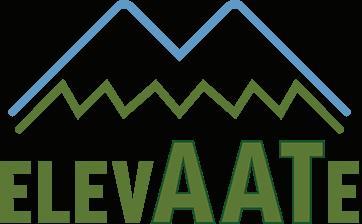

You can also scan the QR code and fill out the pre-screening inquiry form and an Alpha-1 Foundation representative will get back to you with more information on the trial. Reference: 1. Kuhn BT, Veale A, Farah H, et al. Recombinant human AAT protein INBRX-101 demonstrates potential to achieve lung penetration and normal

The
2024 Alpha-1 National Conference is
taking
CONFERENCE REGISTRATION
Register: alpha1.org/national-conference/
For questions, call (877) 228-7321, ext. 323
DATES TO KEEP IN MIND
April 15th: Early Bird Registration Deadline*
May 10th: Hotel Reservation Deadline
May 15th: In-Person Registration Deadline
*Register by this date to guarantee a conference bag / virtual package
CONFERENCE HOTEL
Hilton Miami Downtown
1601 Biscayne Boulevard, Miami, Fl 33132 (305) 374-0000


PATIENT & FAMILY MEMBER HOTEL ROOM RESERVATIONS
Online: https://group.hilton.com/t7raot
By phone: (800) 445-8667
Patient Rate: $159 / night plus taxes & fees
Group Code: 2024 Alpha-1 National Conference
Rate Deadline: May 10th
OXYGEN TRAVEL FUND
Oxygen & equipment for Alphas in financial need to travel to Alpha-1 educational events is available. To apply, please call (877) 228-7321 ext. 251 with at least 30 days notice.
AGENDA & FAQS
For the detailed Agenda & Things To Know, visit: alpha1.org/national-conference/ A virtual option is available for those who are unable to attend in person.


place in Miami, FL from June 7th to June 9th
CONFERENCE AT A GLANCE
What to look forward to at this year’s conference!
FRIDAY, JUNE 7TH
• Official conference kickoff
• Empowering general session geared toward Alpha-1 patients including the Alpha Empowerment Hour
• Exhibit Hall Grand Opening
• Two (2) afternoon tracks with educational & empowering sessions
• Alpha-1 Parents Meet & Greet
• Dinner reception & awards
SATURDAY, JUNE 8TH
• Alpha Angels Memorial Service
• Enlightening general session geared toward Alpha-1 research including the Alpha-1 Research Panel & Emerging Therapies in Alpha-1
• Three (3) afternoon tracks with educational presentations on a range of Alpha-1 topics
• Dinner reception & entertainment
SUNDAY, JUNE 9TH
A farewell breakfast celebration you won’t want to miss!
Ask the Alpha Doc: Your Alpha-1 Questions Answered
Q: Who should test for Alpha-1 Antitrypsin Deficiency (Alpha-1)?
A: It is recommended that those that fall into one or more of the following categories be tested for Alpha-1:
▶ People with COPD (chronic obstructive pulmonary disease), a group of lung diseases including emphysema, that blocks airflow and makes it difficult to breathe
▶ Individuals with unexplained chronic liver disease
▶ Individuals with panniculitis, a skin condition that some people with Alpha-1 develop
▶ Parents, siblings, children, and extended family members of people diagnosed with Alpha-1 Antitrypsin Deficiency
▶ I would suggest that all individuals with a family history of COPD should also be tested.
Q: What is tested for in the Alpha-1 Foundation’s Alpha-1 Coded Testing (ACT) Study?
A: We test for the most common deficiency alpha-1-antitrypsin genes and measure each subjects’ alpha-1 antitrypsin level from the dried blood spot card. Using this approach, we can assign the following alleles: MM, MZ, MS, ZZ, SS, Znull/rare deficiency allele, Snull/rare deficiency allele and Mnull/ rare deficiency alleles. As an example, an individual that has MS on genotyping but has a very low alpha-1-antitrypsin level is actually a Z plus a null/rare allele. There are well over 75 rare and null alleles not currently available on any screening test. Individuals that are assigned a Null/ rare allele are invited to join the Alpha-1 Foundation’s DNA and Tissue Bank and send in an additional sample and their alpha-1 antitrypsin gene will be sequenced to determine which null or rare deficiency allele they have.
Q: What is an allele?
A: Alleles are two sets of genes; one from our biological mother, one from our biological father. We have two copies of every gene (strings of code that drive some biological function on our chromosomes). They can be identical, but they can often have slight differences. For Alpha-1 Antitrypsin Z is
by Dr. Mark Brantly
an allele as is S, M and several others. For example, every person has 2 alleles such as MM, MZ, ZZ, or SZ.
Q: Should I be concerned if I have a Rare or Null allele?
A: Null and rare deficiency alleles are clinically important when they occur in a pairing of another deficiency allele such a Z. For most rare deficiency and null alleles there is very little information on their actual risk for disease (they are rare). In this context experts draw on several factors to estimate the risk for lung and/or liver disease in deficiency alleles where there is insufficient information to be “well studied”.
Q: What is my risk of developing lung or liver disease if I am MZ?
A: The vast majority of MZ individuals who do not smoke or have secondary liver disease will not develop disease related to being an MZ. However, individuals who smoke and are MZ may have a substantially increased risk of developing lung disease. It is less clear what the risk of liver disease is for MZ individuals that have fatty liver, cystic fibrosis and other causes of liver disease.
The Alpha-1 Foundation provides free, confidential genetic testing through the Alpha-1 Coded Testing (ACT) Study, in partnership with the University of Florida. The test can be done at home with a simple fingerstick. To learn more about the ACT study or to order a free test kit, please visit alpha1.org/about-alpha-1testing-diagnosis/.

IT'S POSSIBLE TO
RAISE YOUR ALPHA-1 LEVELS
Prescribed by doctors for 10+ years, GLASSIA® has been proven to help increase Alpha-1 protein levels in the blood and lungs.* —KATHY S. Actual GLASSIA patient
After you and your physician choose a treatment path, OnePath® provides a range of personalized product support services throughout your GLASSIA treatment journey. For more information, visit www.onepath.com.
What is GLASSIA?
GLASSIA is a medicine containing human Alpha₁-Proteinase Inhibitor (Alpha₁-PI) that is used to treat adults with lung disease (emphysema) because of severe Alpha₁-antitrypsin (Alpha₁) deficiency. GLASSIA is not meant to be used as a therapy for lung disease other than severe Alpha₁ deficiency. Effects of GLASSIA on worsening lung function and emphysema progression have not been proven in clinical trials. Long-term effects of Alpha₁ replacement and maintenance therapy have not been studied.
IMPORTANT SAFETY INFORMATION
What is the most important information I need to know about GLASSIA?
• GLASSIA can cause severe allergic reactions including hives, swelling in the mouth or throat, itching, tightness in the chest, trouble breathing, wheezing, faintness or low blood pressure
• If you will be taking GLASSIA outside a healthcare setting, ask your healthcare provider (HCP) about an epinephrine pen and/or other supportive care for certain severe allergic reactions.
Who should not use GLASSIA?
Do not use GLASSIA if you:
• Have immunoglobulin A (IgA) deficiency with antibodies to IgA
• Have a severe allergic reaction to human Alpha₁-PI products.
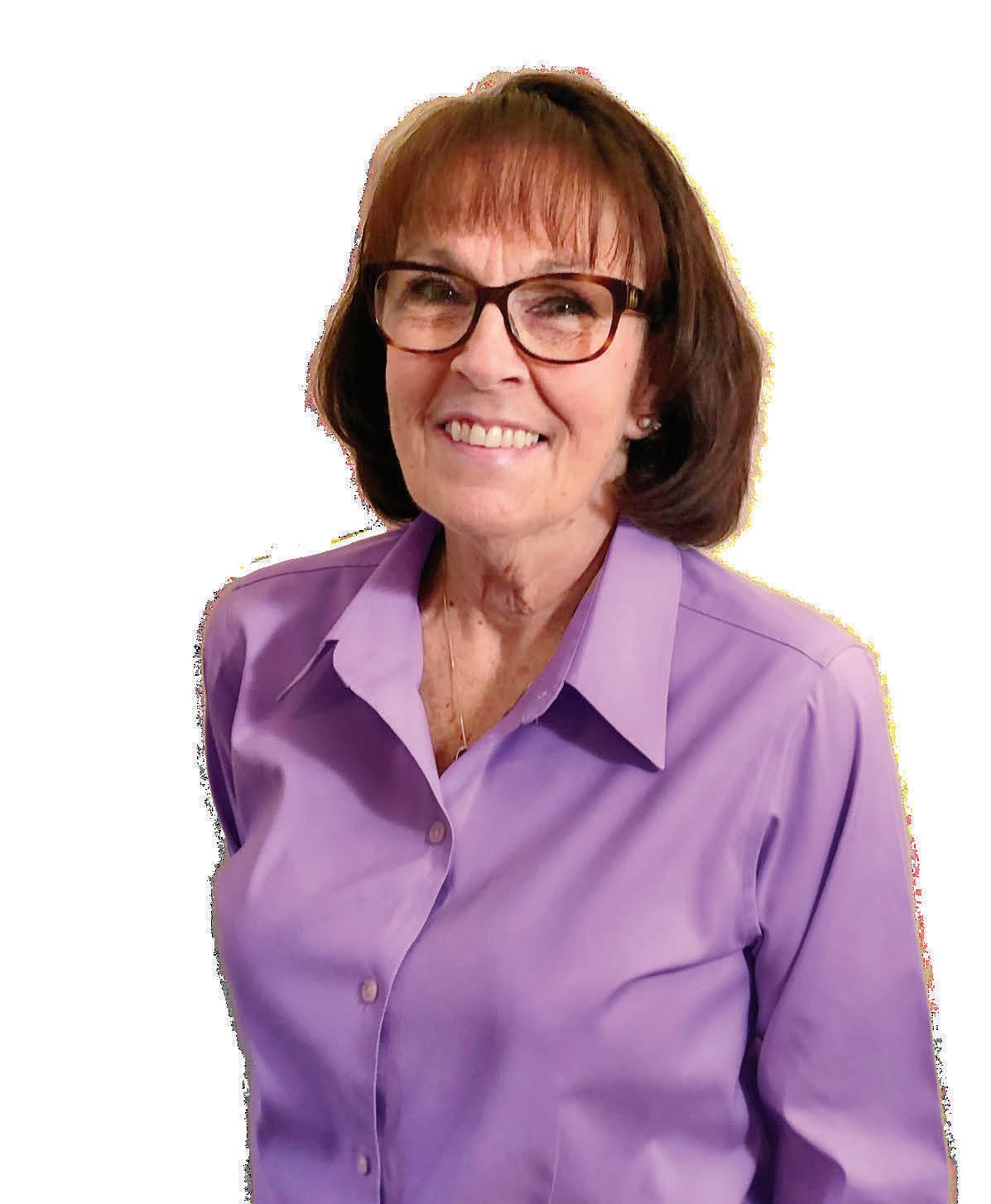

IMPORTANT SAFETY INFORMATION, CONTINUED
What are the possible or reasonably likely side effects of GLASSIA?
If any of the following problems occur contact your healthcare provider (HCP) or call emergency services right away:
• Worsening or flare-up of your chronic obstructive pulmonary disease (COPD)
• Hives, swelling in the mouth or throat, itching, chest tightness, trouble breathing, wheezing, fainting or dizziness. These could be signs of a serious allergic reaction.
The most common side effects that may occur are headache and upper respiratory tract infections.
Other possible side effects of GLASSIA include:
• Cough
• Sinus infection
• Chest discomfort
• Dizziness
• Increased liver enzymes
• Shortness of breath
• Nausea
• Fatigue
These are not all the possible side effects. Tell your HCP about any side effect that bothers you or that does not go away. You are encouraged to report negative side effects of prescription drugs to the FDA. Visit www.fda.gov/medwatch, or call 1-800-FDA-1088.
Please see the Important Facts About GLASSIA on the next page.
IMPORTANT FACTS ABOUT GLASSIA (glasssee-ă) [Alpha1-Proteinase Inhibitor (Human)]
Injection Solution – For Intravenous Administration
What is GLASSIA?
GLASSIA is a liquid medicine containing human Alpha1-Proteinase Inhibitor (Alpha1-PI) also known as alpha1-antitrypsin (AAT), which is purified from human blood. The main purpose of infusing GLASSIA is to increase the levels of the AAT protein in your blood and lungs. AAT protein protects the lung tissue by blocking certain enzyme-caused damage. Such damage can lead to severe lung disease, such as emphysema.
Limitations of Use:
• The effects of increasing the AAT protein levels with GLASSIA or any other Alpha1-PI product on worsening pulmonary function and progression of emphysema have not been proven in clinical trials.
• The long-term effects of AAT replacement and maintenance therapy with GLASSIA have not been studied.
• GLASSIA is not intended as a therapy in individuals with lung disease other than severe Alpha1-PI deficiency.
Who should not use GLASSIA?
Do not use GLASSIA if you:
• Have immunoglobulin A (IgA) deficiency with antibodies to IgA
• Have had a severe allergic reaction to human Alpha1-PI products.
What is the most important information that I should know about GLASSIA?
Severe allergic reactions can occur with GLASSIA. Your doctor will inform you about signs of allergic reactions which include hives, swelling in the mouth or throat, itching, tightness in the chest, trouble breathing, wheezing, faintness, low blood pressure, or serious allergic reaction. If you have any of these reactions, discontinue use of the product and contact your physician and/or seek immediate emergency care, depending on the severity of the reaction.
If you or your caregiver will be administering GLASSIA outside a healthcare setting, ask your doctor about an epinephrine pen and/or other supportive care for certain severe allergic reactions. Ask your doctor to make sure you receive training on how and when to use any prescribed supportive care medicine and keep it close at hand when administering GLASSIA.
How should I take GLASSIA?
• GLASSIA is given directly into the bloodstream.
• You can get GLASSIA at your healthcare professional’s office, clinic, hospital, or delivered directly to your home by a healthcare professional from a limited network of specialty pharmacy providers.
• Your healthcare professional will decide if self-infusion in your home is right for you. You should be trained on how to do infusions by your healthcare professional.
What should I tell my healthcare professional before I start using GLASSIA?
Before starting GLASSIA, tell your healthcare professional if you:
• Have IgA deficiency with antibodies to IgA.
• Have a history of severe allergic reactions to Alpha1-PI products.
What are the possible or reasonably likely side effects of GLASSIA?
• A possible side effect to GLASSIA is worsening or flare-up of your chronic obstructive pulmonary disease (COPD) in which your breathing gets worse than usual.
• Call your healthcare professional or go to your emergency department right away if you get: Hives, swelling in the mouth or throat, itching, chest tightness, trouble breathing, wheezing, fainting or dizziness. These could be signs of a serious allergic reaction.
• The most common side effects are headache and upper respiratory tract infections. Other possible side effects of GLASSIA include: cough, sinus infection, chest discomfort, dizziness, increased liver enzymes, shortness of breath, nausea, and fatigue.
These are not all of the possible side effects for GLASSIA. You can ask your healthcare professional for information that is provided to healthcare professionals. Talk to your healthcare professional about any side effects that bother you or that don’t go away.
How do I store GLASSIA?
Store GLASSIA refrigerated or at room temperature.
• You can store GLASSIA in the refrigerator (36°F to 46°F [2°C to 8°C]). Do not freeze.
• You can store GLASSIA at room temperature (up to 77°F [25°C]) for up to one month. You must use GLASSIA within one month once you remove it from the refrigerator. Do not re-refrigerate GLASSIA once the product has been stored at room temperature.
• Keep the GLASSIA vial in the box until you are ready to administer the product.
Check the expiration date on the carton and vial label. Do not use GLASSIA after the expiration date.
How do I get more information about GLASSIA?
The risk information provided here is not comprehensive. To learn more, talk about GLASSIA with your healthcare provider. The FDA-approved Full Prescribing Information including Information for Patients and Instructions for Use can be found at www.glassia.com or call 1-877-TAKEDA-7 (1-877-825-3327).
Manufactured by: Distributed by: Kamada Ltd. Baxalta US Inc.
Beit Kama Lexington, MA
MP Negev 853250002421
Israel USA
U.S. License No. 1826
US-GLA-0282v1.0
Rev 7/21
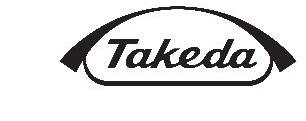
Terri Leffler: A Light in the Alpha-1 Journey
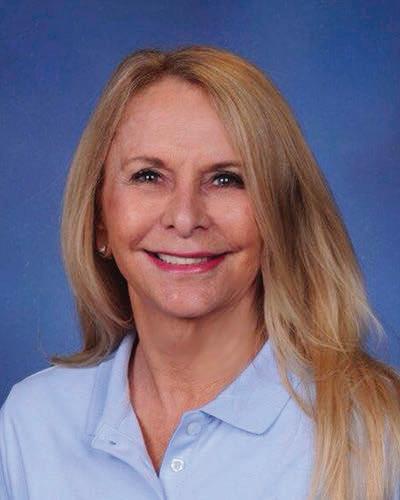
In Brandon, Mississippi, there’s a force to be reckoned with in the fight against Alpha-1 Antitrypsin Deficiency (Alpha-1): Terri Leffler. As an AlphaNet Coordinator (ANC), she’s more than just a point of contact; she’s a beacon of hope for those grappling with the complexities of Alpha-1.
Terri’s journey with Alpha-1 is intricately tied to her family’s legacy, notably her brothers Michael and Bruce, both diagnosed four decades ago. In 2006, her health took a turn, coinciding with her purchase of an aged home with old wooden floors. Severe lung infections and breathlessness ensued, leading to her inability to sustain a full-time job within six months.
Despite starting infusion therapy shortly after her own diagnosis of Alpha-1 in January 2007, Terri’s health continued to decline. It wasn’t until October 2010 that the root cause was revealed: her home harbored various toxic mold strains, including Stachybotrys, Penicillium, and Aspergillus, exacerbating her Alpha-1 symptoms and other health issues.
Moving out of the mold-infested house marked a turning point for Terri’s health. Embracing a clean living environment, consistent infusion therapy, proper nutrition, regular exercise, and access to clean air and water have allowed her to reclaim a healthy lifestyle despite the challenges posed by Alpha-1 and environmental triggers.
Driven by her personal experience, Terri transformed her plight into a mission to assist others facing similar challenges. Joining AlphaNet in 2014 wasn’t just a career move for Terri; it was destiny when a former colleague, Kathy Collett, recognized her unwavering passion and invited her to join the team. Since then, she’s been a steadfast support system for Alphas on augmentation therapy across multiple states, including Alabama, Florida, Georgia, Mississippi, North Carolina, Puerto Rico, and South Carolina.
“For me, being an ANC isn’t just a job—it’s a calling, a chance to make a real difference in people’s lives,” Terri shares, reflecting on her commitment to the Alpha-1 community. “My goal is simple yet profound: to serve as long as I can and keep my Alpha-1 family strong.”
Through her calls and comforting conversations, Terri forges meaningful connections with her Alpha-1 community, finding solace in the small yet poignant moments she shares with her patients.
“One of my guys in Texas, when I covered it, his big thing was, ‘Terri, have you gone to Whataburger? And he loved their jalapeno biscuit,’ and every time I go by there, I have a biscuit in honor of him,” she reminisces, illustrating the profound impact of these connections on her life.
Terri’s parting words are filled with hope and resilience. Despite the challenges, she believes in the power of positivity and making proactive choices. Beyond her professional endeavors, Terri finds fulfillment in her role as a grandmother, fondly known as “Mimi” to her seven grandchildren. Her commitment to spreading love and strength extends to her furry companion, Bailey, a Maltipoo who holds a special place in her heart. 1 ALPHA-1 FOUNDATION
Alpha-1 Biomarker Consortium (A1BC)
Study Completes Enrollment
We are proud to announce that The Alpha-1 Biomarker Consortium (A1BC) Study is the largest enrolling Alpha-1 study and has reached its goal of 270 participants. In May 2020, the National Institutes of Health (NIH) awarded this grant to identify and characterize biomarkers in Alpha-1. The study aims to improve our understanding of Alpha-1 and accelerate the discovery, development and advancement of new treatments and ultimately, a cure for Alpha-1.
The A1BC study follows 270 patients enrolled in the Alpha-1 Foundation Research Registry to identify biomarkers that can be used to advance Alpha-1 clinical trials. The Alpha-1 Research Registry played a key role in facilitating the A1BC Study achieve its enrollment goal by inviting likely eligible Registry participants to join this study. The Alpha-1 Foundation took the extra step
and assisted with travel funding for A1BC participants who were not located close to a study site. Over a three-year period, the study follows a cohort of patients with confirmed PiZZ Alpha-1 to measure several different biomarkers in blood and sputum and obtain high resolution CT scans at baseline, 18 months and 3 years later. The goal is to validate biomarkers that correlate with lung or liver disease progression.
Led by co-Principal Investigator Jeanine D’Armiento, MD, PhD, Columbia University, and Charlie Strange, MD, Medical University of South Carolina, the A1BC Study is funded through a multicenter grant from the National Institutes of Health (NIH) and supplemented by funding from the Alpha-1 Foundation. This highly competitive grant was designed to fund research that will establish longitudinal cohorts in a rare heart, lung, blood and sleep disorders area,
Boston University
Dr. Andrew Wilson, MD (Site Investigator)
investigate unanswered research questions using epidemiologic study designs and methods that are appropriate for rare disease groups, provide an evidence base for future interventional studies, including clinical trials, develop better diagnostics than those that are currently available, answer early translational questions and to broaden implementation of guidelines for managing Alpha-1.
“We reached a very exciting point in the study as we have successfully recruited all 270 participants. From the very start in 2020, this grant was only possible due to the asset of the Alpha-1 Research Registry built by the Foundation. It is in collaboration with our consortium sites and with the enthusiastic Alpha-1 patient community that we continue to meet and succeed of goals,” explained Dr. Jeanine D’Armiento. 1 ALPHA-1 FOUNDATION
Jeanine D’Armiento, MD, PHD (Principal Investigator) and Monica Goldklang, MD (Co-Investigator)
Charlie Strange, MD (Principal Investigator)
Robert Sandhaus, MD, PhD (Site Investigator)
J. Michael Wells, MD, MSPH (Site Investigator) and Surya P. Bhatt, MD, PSPH (Co-Investigator)
Igor Barjaktervic ( Site Investigator)
University of Chicago
Kyle Hogarth, MD (Site Investigator)
University of North Carolina at Chapel Hill
M. Bradley Drummond, MD, MHS (Site Investigator)
University of Utah Health Center
Cheryl Pirozzi, MD (Site Investigator)
Royal College of Surgeons in Ireland – International Validation Center
G. Noel McElvaney, MD (International Co-Investigator)
What is a biomarker?
A biomarker is a feature or characteristic that can signal or predict how well the body responds to a treatment for a condition or disease, or if a condition or disease is getting better or worse.
Biomarkers can be detected or measured in blood, other body fluids, or tissues. They are a sign of a normal or abnormal process, or of a condition or disease. For example, FEV1 (forced expiratory volume) – the air you exhale in 1 second – is used to predict lung decline.
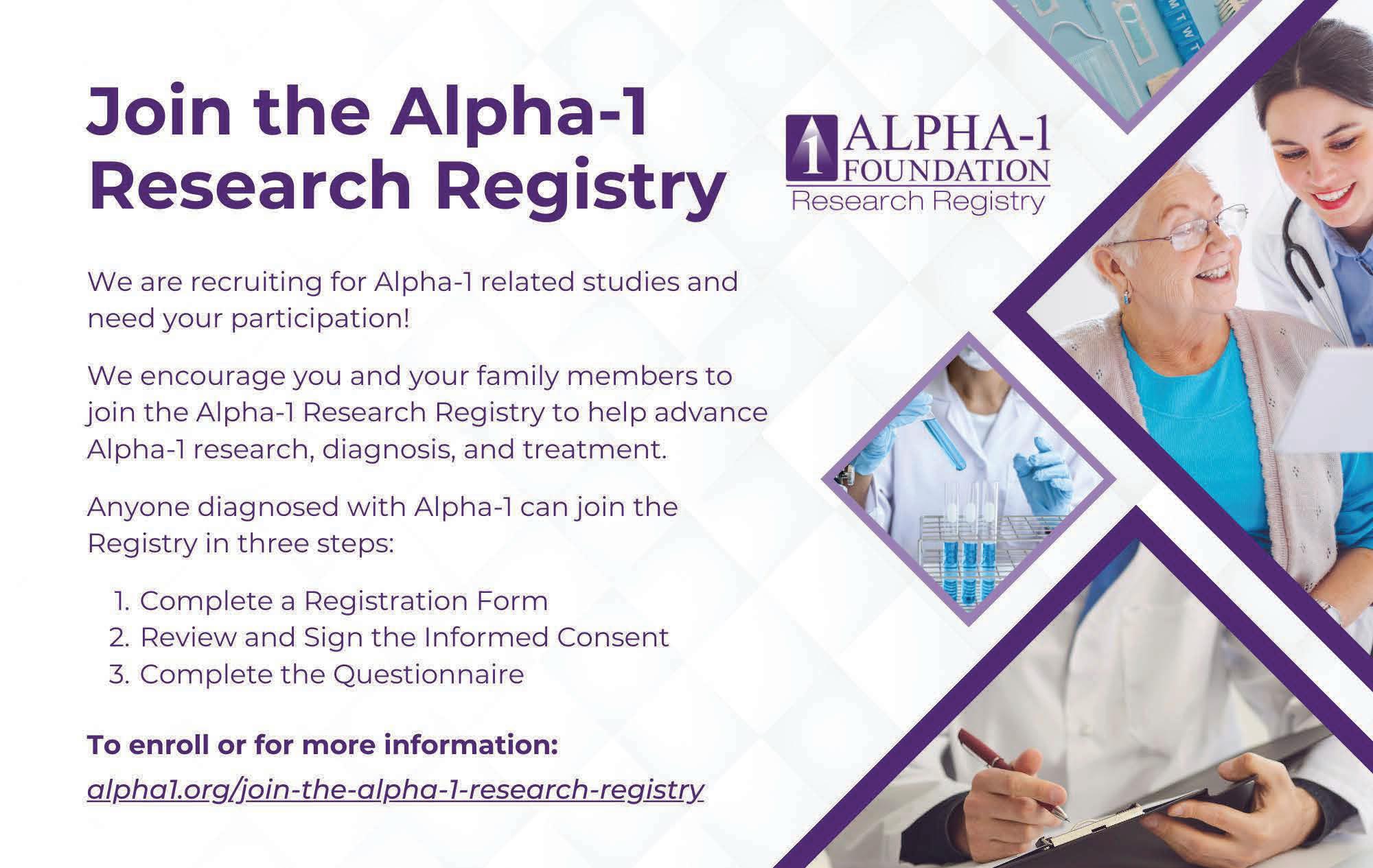
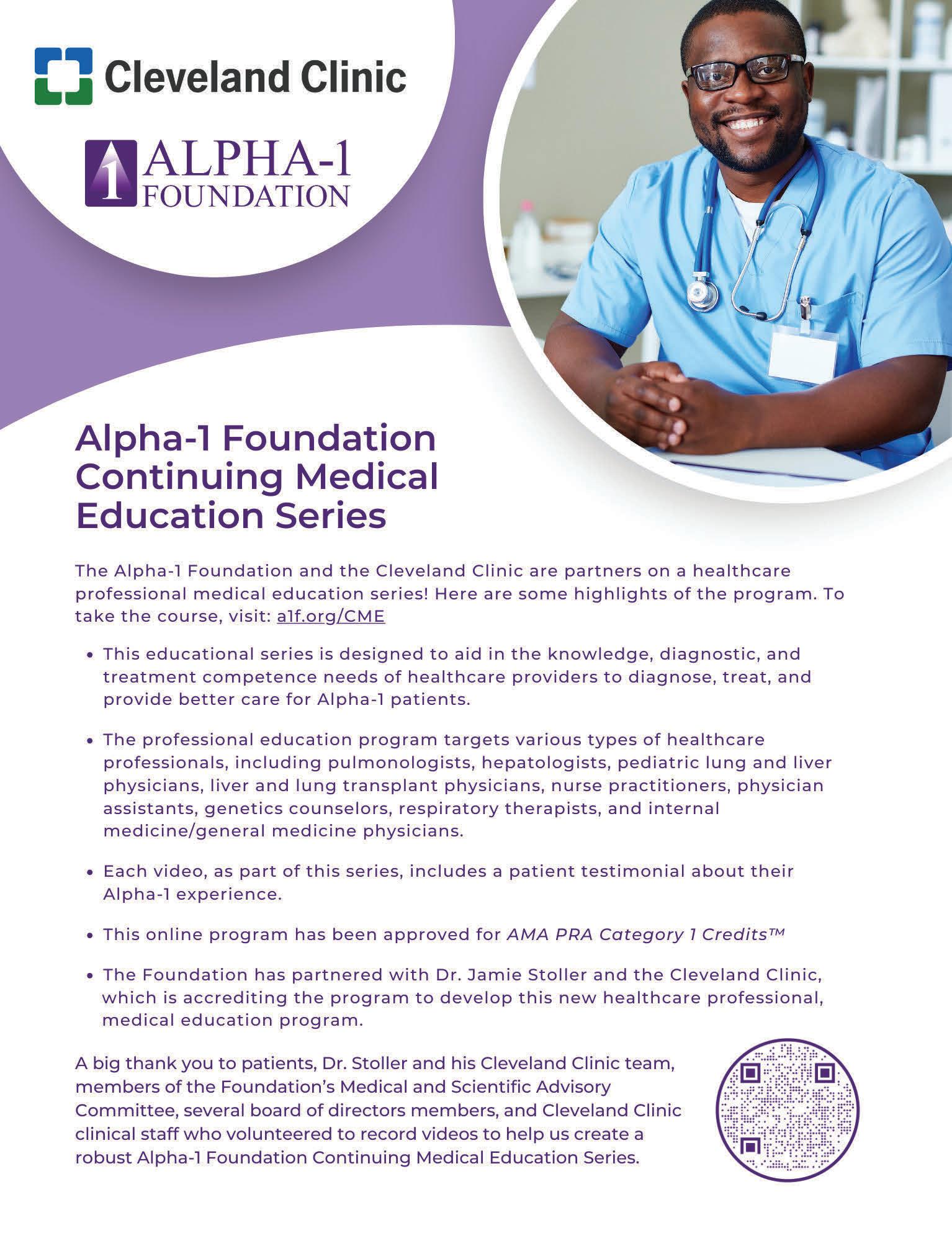


PROLASTIN®-C LIQUID
Alpha1-Proteinase Inhibitor (Human)
HIGHLIGHTS OF PRESCRIBING INFORMATION
These highlights do not include all the information needed to use PROLASTIN-C LIQUID safely and effectively. See full prescribing information for PROLASTIN-C LIQUID.
PROLASTIN-C LIQUID (Alpha1-Proteinase Inhibitor [Human]) Solution for Intravenous Injection
Initial U.S. Approval: 1987
---------------------INDICATIONS AND USAGE --------------------
PROLASTIN®-C LIQUID is an Alpha1-Proteinase Inhibitor (Human) (Alpha1-PI) indicated for chronic augmentation and maintenance therapy in adults with clinical evidence of emphysema due to severe hereditary deficiency of Alpha1-PI (alpha1-antitrypsin deficiency).
Limitations of Use:
• The effect of augmentation therapy with any Alpha1-PI, including PROLASTIN-C LIQUID, on pulmonary exacerbations and on the progression of emphysema in Alpha1-PI deficiency has not been conclusively demonstrated in randomized, controlled clinical trials.
• Clinical data demonstrating the long-term effects of chronic augmentation or maintenance therapy with PROLASTIN-C LIQUID are not available.
• PROLASTIN-C LIQUID is not indicated as therapy for lung disease in patients in whom severe Alpha1-PI deficiency has not been established.
-----------------DOSAGE AND ADMINISTRATION----------------
For intravenous use only.
• Dose: 60 mg/kg body weight intravenously once per week.
• Dose ranging studies using efficacy endpoints have not been performed with any Alpha1-PI product, including PROLASTIN-C LIQUID.
• Administration: 0.08 mL/kg/min as determined by patient response and comfort.
---------------DOSAGE FORMS AND STRENGTHS --------------
For injection: approximately 500 mg (10 mL), 1,000 mg (20 mL) and 4,000 mg (80 mL) of a solution for injection in single-dose vials.
------------------------CONTRAINDICATIONS -----------------------
• Immunoglobulin A (IgA) deficient patients with antibodies against IgA.
• History of anaphylaxis or other severe systemic reaction to Alpha1-PI.
-----------------WARNINGS AND PRECAUTIONS ----------------
• Severe hypersensitivity and anaphylactic reactions may occur in IgA deficient patients with antibodies against IgA. Discontinue administration of the product and initiate appropriate emergency treatment if hypersensitivity reactions occur.
• Because PROLASTIN-C LIQUID is made from human plasma, it may carry a risk of transmitting infectious agents, e.g., viruses, the variant Creutzfeldt-Jakob disease (vCJD) agent, and, theoretically, the Creutzfeldt-Jakob disease (CJD) agent.
------------------------ADVERSE REACTIONS-----------------------
The most common adverse reactions during PROLASTIN-C LIQUID clinical trials in > 5% of subjects were diarrhea and fatigue, each of which occurred in 2 subjects (6%).
To report SUSPECTED ADVERSE REACTIONS, contact Grifols Therapeutics LLC at 1-800-520-2807 or FDA at 1-800-FDA-1088 or www.fda.gov/medwatch.

Grifols Therapeutics LLC
Research Triangle Park, NC 27709 USA
U.S. License No. 1871
3062338/3062339
Revised: 5/2020

Make Your Legacy Go Further
Your legacy can support the Alpha-1 Foundation, not just today, but for years to come.
Many of our supporters have included a gift to the Foundation in their estate plans to make a lasting impact at no cost today.
To learn more about planned giving and leaving a legacy, visit www.alpha1.org/planned-giving/.

For more information about joining the Alpha-1 Legacy Society, visit www.alpha1.org/alpha-1-legacy-society/.
For additional information or to discuss planned gifts to the Foundation, please contact Angela McBride at amcbride@alpha1.org or call
Support Group Leader: Mike Allen
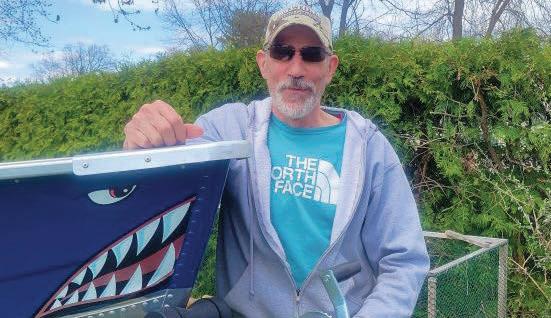
In Schenectady, New York, resides a man whose life story is of resilience, community, and unwavering dedication to others—Michael E. Allen. Growing up in a tight-knit neighborhood, Mike learned the value of connections from a young age, a lesson that continues to shape his life today.
For nearly four decades, Mike poured his heart and soul into his career in construction. But as the years passed, his lungs began to show signs of distress. Annual battles with pneumonia and a severe period of bronchitis hinted at a deeper health issue.
“In the late ‘90s, I began to develop yearly bouts of pneumonia,” Mike recalls. “Then, in 2000, I was admitted to the hospital for severe bronchitis. Even after a 10-day stay, I didn’t feel quite right.”
During a routine remodeling project, a fortunate turn of events occurred. Mike was working on a job for the head of nursing at one of the largest hospitals in the area and she facilitated an appointment for him a lung specialist. This encounter led to a pivotal moment in Mike’s life: the diagnosis of Alpha-1 Antitrypsin Deficiency (Alpha-1).
“It was a turning point,” Mike reflects. “Suddenly, everything made sense. But it also marked the beginning of a new journey—a journey of selfdiscovery and advocacy.”
Mike found strength in the stories of fellow Alphas. His AlphaNet coordinator, a double lung transplant recipient, became a beacon of hope, showing him that life could still hold joy and purpose after diagnosis. The connections also provided Mike with a link to the broader Alpha-1 community and resources offered by the Alpha-1 Foundation. He was given the tools to navigate life with Alpha-1 with optimism and resilience.
Despite the challenges his condition posed, Mike’s determination never wavered.

“After realizing the hazards to my lungs of continued work in construction, I made the difficult decision to transition to a different field,” Mike explains. “I needed to prioritize my health while still finding ways to make a positive impact.”
Mike’s journey led him to the retail industry, where he found fulfillment in helping customers and sharing his expertise. However, as the exertion of walking throughout the store and exposure to dust took its toll, Mike knew he needed to make another change.
He turned to his passion for craftsmanship and began creating intricate wood pieces in his woodshop including cutting boards, custom cheese boards, bottle openers, and jewelry boxes from premium wood. Notably, his creations also serve as a way to raise money for Alpha-1 research.
Mike’s impact goes beyond his woodshop. Through virtual racing on the iRacing platform, he raises awareness for causes close to his heart, including Alpha-1. Organizing a Building Friends for a Cure (BFC) fundraiser titled “The Alpha-1 600”, Mike brings together virtual drivers from around the world to support the Alpha-1 community. He has also participated as a rider in the annual Escape to the Cape Bike Trek in Cape Cod. Raising awareness and funds through the event.
“As an Alpha-1 advocate, I’m committed to raising awareness and supporting others on their journey,” Mike emphasizes. “It’s about coming together as a community to make a difference.”
As co-leader with Richard Lovrich of his local Alpha-1 support group, Mike embodies the spirit of community and resilience. Mike always offers these words of encouragement and wisdom to those facing a new Alpha-1 diagnosis: “Stay strong. Stay positive. There’s a lot of help available now.”
Mike’sjourney is a source ofencouragement for fellowAlphas.Through hisstrength,compassion, and unwaveringdetermination, he sets a powerfulexample. 1 ALPHA-1
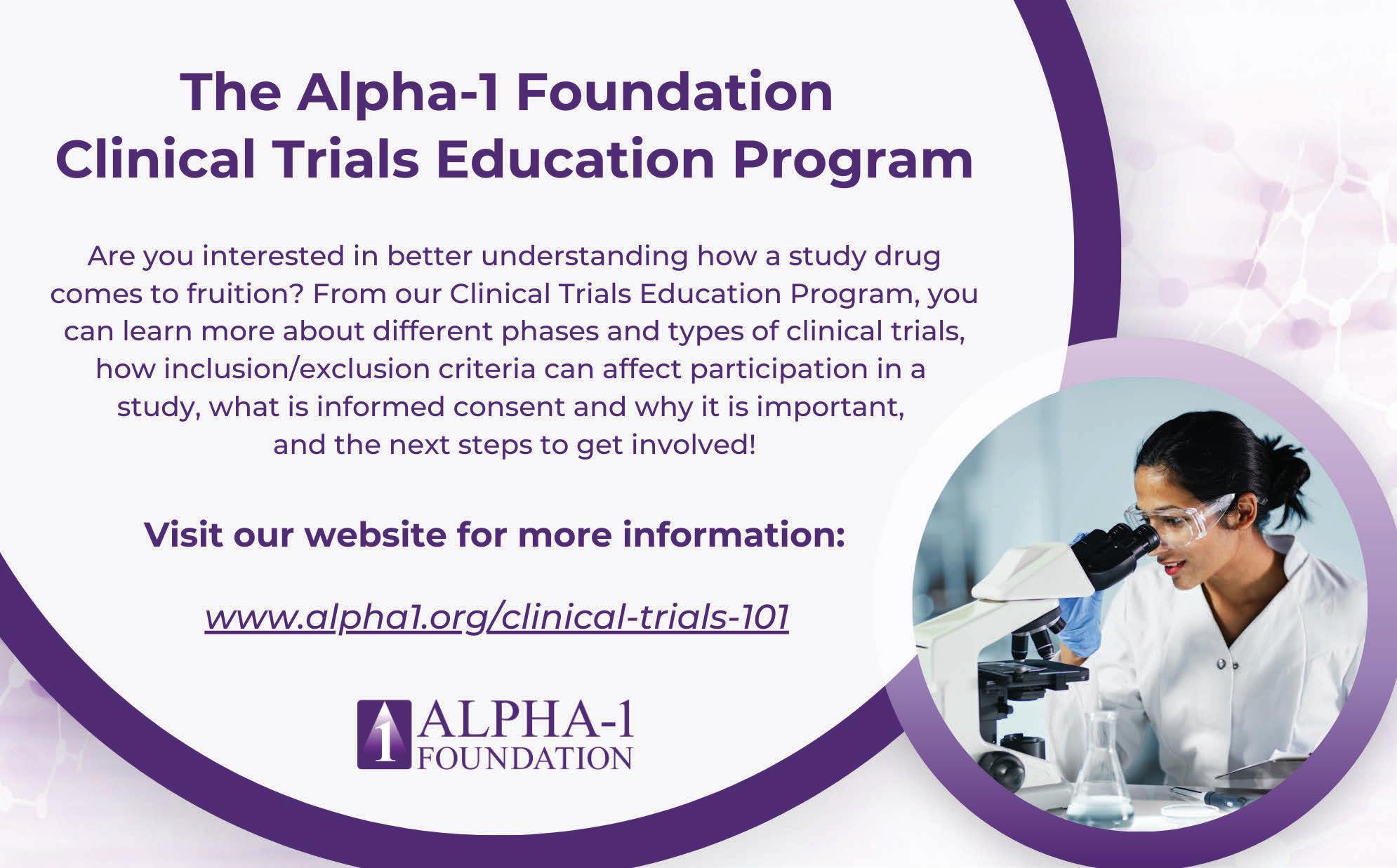 FOUNDATION
FOUNDATION
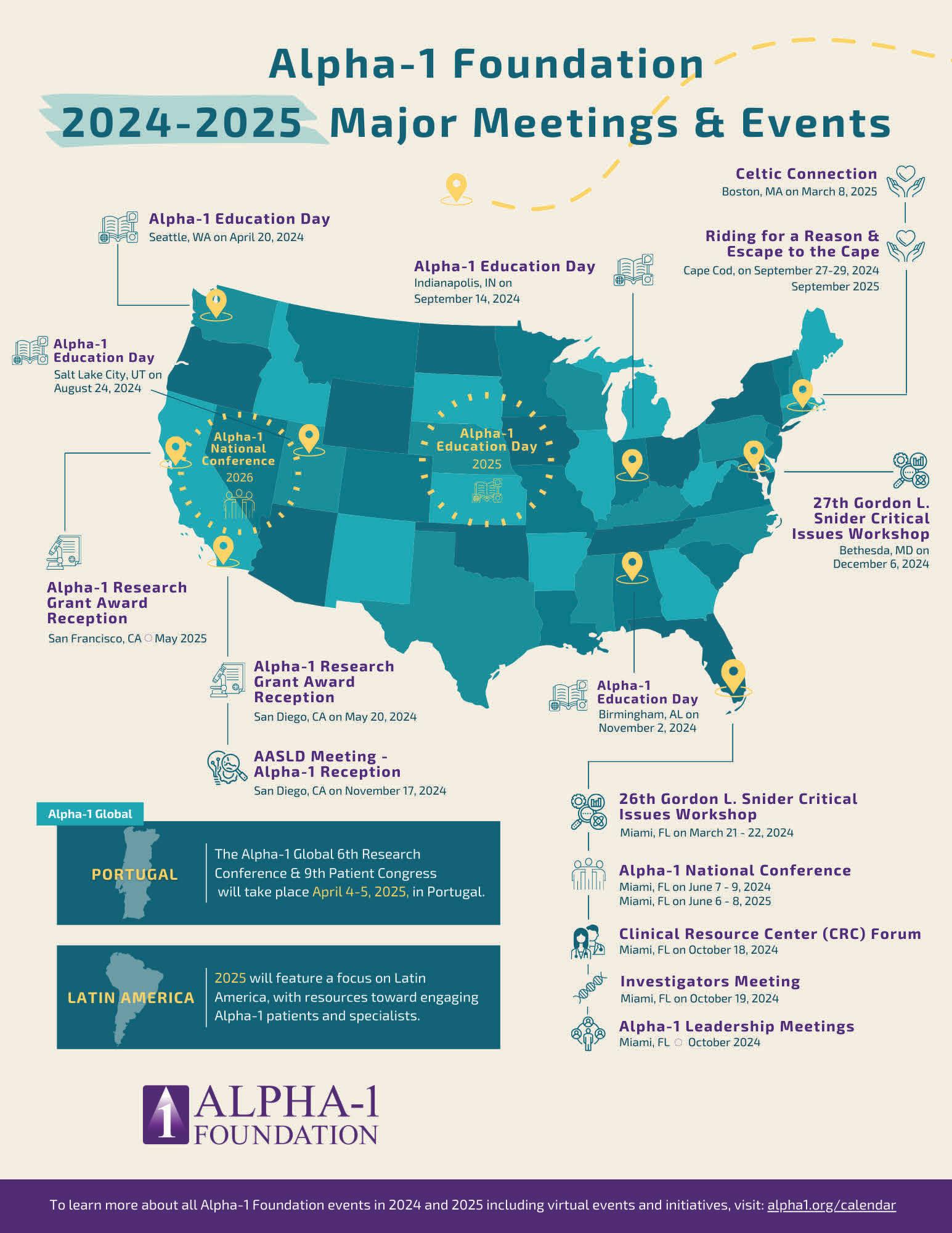

www.alpha1.org
Are you receiving our emails?
Alpha-1 Foundation @alpha1foundation @alphafriend in Alpha-1 Foundation
Do you receive the monthly e-newsletter “Community Currents”? This is a good time to check to that you are on our e-mail list. Update your contact information by visiting www.alpha1.org.
SUPPORT GROUP MEETINGS
Support groups are meeting both in-person and virtually on Zoom to provide everyone the support and education they need. To find your local Support Group and view the complete list of upcoming meetings, visit www.alpha1.org and the Events Calendar online.
UPCOMING EDUCATION EVENTS
April 11, 2024
April 20, 2024
June 7-9, 2024
August 24, 2024
September 14, 2024
November 2, 2024
Alpha-1 Beginner Advocacy Training & Workshop Virtual
Alpha-1 Education Day Seattle, WA
Alpha-1 National Conference Miami, FL
Alpha-1 Education Day Salt Lake City, UT
Alpha-1 Education Day Indianapolis, IN
Alpha-1 Education Day Birmingham, AL
For more information about Alpha-1 Education Days, please visit www.alpha1.org
UPCOMING EVENTS
Spring 2024
September 2024
September 27-29, 2024
Jonathan Maidment Hiking for a Cure
Riding for a Reason Virtual
Escape to the Cape Bike Trek Cape Cod, MA
For more information about Building Friends for a Cure, please contact: Angela McBride (877) 228-7321 ext. 233 or amcbride@alpha1.org


Do you receive Alpha-1 Foundation emails, event reminders, or fundraising updates? If not, please update your e-mail address by visiting our new website at:
